#often in a context where it's not precise at all
Text
-.-
#i'm just going to say it otherwise i will explode#if your way of overcoming the gender binary#leads to you creating the categories '(cis) men' and 'other'#that's not overcoming the gender binary that's creating a new one#and one that takes away from both women and genderqueer/nb/agender people at that#and also like. i'm a cis woman but i doubt trans men and nonbinary people are happy about being lumped into the broader category of#'women and other/women +/women*/anyway not MEN at any rate'#is it a language thing? because i don't think i've seen it in english but all the more in german#often in a context where it's not precise at all#like free hygiene products or catcalling#...you do know that not all people who aren't cis men have uteri or get yelled at with 'OI NICE TITS' yeah?#and at the end of the day it boils down to 'cis men are oppressors in general and anyone else is automatically a victim'#and doesn't that sound familiar#phew i have Thoughts on this#if you do too (in agreement or not) send me a chat message if you feel like it?#tdl#probably#loquor
6 notes
·
View notes
Note
Advice for writing smut???
gonna do bullet-points of things i tend to live by when it comes to smut (this is just my opinion):
don't switch styles: the way you write the smut has to be consistent with the way you write the rest of the story, so if your story is more comedic or romcom-y in nature, the way you write the smut should have those stylings. i personally find it very jarring when authors decide to break the format for the smut, almost like the story has to stop for the sex intermission; if you're writing a horror story, the smut must be informed and influenced by that genre, and if you are breaking genre for the smut portion, tell us why you're suddenly switching gears (it has to be an aesthetic choice you're making on purpose). likewise, if your style in that story is more lyrical, the smut has to be somewhat lyrical too, or if your story is more cormac mccarthy-esque-cut-and-dry, the smut can't suddenly involve an effluvia of purple, sappy prose. integrating the smut in the story and treating it like any other part of the story is key to me. too often i've seen ppl switch to this anonymous pornified style when they get to the smut
which brings me to specificity. i'll talk about het sex, since that's what i tend to write most: not all men are going to be fingering or eating pussy the same way, not all dicks are big and they shouldn't be, not all women immediately get excited by fingering, not everyone moans the same way or makes the same sounds. you're writing about particular characters so it has to be particular to them. i know this is very old advice, but i think it bears repeating
there isn't an exact formula or sequence you have to follow, there aren't precise steps, you don't have to go "well, first he has to kiss down her neck, then reach the boob area, then play with the nipples, then put the nipple in his mouth, then slowly go down on her, then prepare her for entering her etc. etc. etc." this can get boring and repetitive and you start thinking of your characters as these mechanical dolls who have to fuck for your audience. and that can be a vibe too, if you do it on purpose. but sometimes you can get stuck in a porn routine (and ofc, having only the guy show initiative can also get boring)
in order to break that, insert some character moments. what are the characters thinking during this? sometimes they might be thinking of something completely unrelated on the surface, but which has a thematic relevance that can make the scene hotter. likewise, maybe they're doing smth that seems unsexy on the surface, but which, within the context of the story might be really hot. sex doesn't just involve, well, sex, but so much weirdness and humanity and creativity. two bodies (usually) are trying to do this really awkward thing together and they might have a lot of baggage and history to inform it. there's a lot you can do with that.
don't make it glossy and clean, where everyone smells of strawberry shampoo and there is never anything out of sync. the most boring smut tends to be the kind where no one makes any mistakes and everything is super efficient. i imagine it feels like using an industrial pump to milk various farm animals.
and you know what? you can make that hot too. you CAN write a kind of robotic efficient smut and make it really interesting based on the context. let's say you're writing a 1984 AU fic where ppl are forced into intimacy only to procreate and their sex drive is diminished. you can play with that premise and lean into the dehumanizing industrialization of sex, but you have to mean it, aka your narratorial voice must be conscious of these factors.
if you're writing dubcon, make the dubious part present, make sure you draw out the ambivalence and ambiguity. if you're writing noncon, the character whose consent is being violated has to be transformed by this in some way. it can be forced pleasure, for instance, but not only. it has to be a journey for them too, some kind of spiritual pit, or a form of access to terrible knowledge. i know this is a personal thing, but noncon doesn't work for me if the character being noncon'd is just sort of *there*, suffering passively. i think that sort of dead passivity can be done very well too, but the narratorial voice has to persuade me.
that being said, don't be afraid of fear in consensual sex. terror and vulnerability are a part of consensual sex too, imo, and again, depending on the story and the characters, there's a lot you can explore there
i personally find it really hot when the narratorial voice starts discussing some of the ideas that the story wants to convey during the smut. so like, you can characterize person A and outline their worldview and their plans while they're ramming person B, and the thinking & fucking are thus entwined. idk, i dig that
speaking of which, smut can convey world-building details and social/philosophical ideas, not just emotions and character beats
not all smut has to end with mutual orgasm or even one-sided orgasm, it depends what you want to do or where you want to go. again, you don't have to follow a sequence. plus, it's fun (and hot) to write about frustration and failure too.
if you want to mix up the descriptions, resort to the story & characters. you'll find it's easier to describe someone fondling a boob in a new or at least interesting way if you're thinking about that particular character in that particular story, and not just Man X from planet porn (sorry to be snarky, but mainstream erotica is soooo guilty of this)
screaming & really intense reactions are cool but they have to match the characters and the situations
sometimes, it's hotter if an effect is mild or negated, if the usual outcome doesn't happen; mix up the order of events, toy with the usual reactions. it's not about being original, it's about finding out what works for your characters. writing about sex is, in a way, a performance of it, an attempt to go through the sexual motions, to find out what works and doesn't, to engage with the erotics of text (roland barthes entered the chat)
if you are bored by your own smut, that's a problem. i know we all talk about how hard we find writing smut, and IT IS hard, and sometimes it's not enjoyable, because writing itself is often not enjoyable, but even when it's painful and annoying, it gives you that little intellectual kick like "huh, i'm creating this and making these people do this, and ohh look, i can maybe put this unnamable thing into words". but if you become bored, that's a sign you have to look at the language & characters and figure out what's not working for you
last thing i'll underline: pay attention to your narratorial voice. in this ordeal, you are the seducer. not the characters. you have to seduce us with words and context. your voice matters the most. you can persuade us of anything. but you have to be confident in your weirdness and particularity. this is your bedroom (so to speak), so invite us in.
600 notes
·
View notes
Text
okay now that i have the information, this is a CarLando recap of Singapore gp 2023:
1. lando slapping carlos's ass and carlos's response was “ that was hard” , followed by a blush and momentarily losing track of whatever he was saying.
2. p1 and p3 in quali and cue to lando pinching carlos's boobie to lando brushing his hips against carlos's and cue to carlos following him like he's mezmerized.
3. lando replying “ vamos" under carlos's twitter post and “ CARLOOOOOOOS” under his instagram post. (we all think he's whining for carlos but alright-)
4. the carlando hug. it's beautiful. it's mezmerizing. I've seen it too many times. it's poetic.
5. the podium interviews before the celebrations with carlos and lando mentioning each other more often than they're breathing, the cooldown room where they're just “ ai , ai , ai " and “ oh- oh- oh" (sounded like their foreplay without context). lewis just walks in at the last moment without any background context and the sky commentators went like “ alright, if this is how the reporting for the race happens, we'd want this informative reporting every race weekend ;)) ” [ also cue to them recreating the “ ai ” and “ oh ” ]
6. the carlando podium. that spraying technique from lando onto carlos's mouth and carlos sticking his tongue out like that. and the way carlos's practically chugs champagne onto lando's mouth (for second one reference: check the video where fred is drowning carlos in champagne, it's for a very split moment , but you can see it )
7. the post race press conference with carlando in their married domestic bubble + third wheel lewis. also cue to CarLando sitting together far away from lewis and carlos showing lando something which causes them to smile and get giddy over idk, and carlos following lando quickly in the most babygirl way ever. 🏃🏾♀️
8. carlos's instagram selfie post dedicated to CarLando solely + an insta story of the same post, an insta story solely dedicated to an hd aesthetic picture of their hug, cue to lando resharing the selfie post on his own story with “ #CALANDO” as well as resharing the hug™ on his story, and posting the CarLando selfie on his p2 celebration post. a joint instagram post. 😏
9. to mclaren and ferrari admin celebrating carlos and lando. [ mclaren commenting “ vamos” and scuderia ferrari commenting “ good job lando :) ” ]
10. carlos and lando being congratulated by the mclaren and ferrari mechanics.
11. the post race interview again where carlos suggested lando and him should go out for drinks tonight and smiles whenever he mentions CarLando and tone implications of suggesting he knows CarLando works exist.
12. carlos's radio message of “ gap to lando every lap" and carlos intentionally slowing down just enough to keep lando within drs range , lando understanding the signal. when told by his race engineer about the gap (0.8) carlos goes like “ it's on purpose ”. the amount of precision, trust, teamwork and respect. freaking insane.
#in this essay i will#stella rambles#i hope i covered anything#if i did leave anything out let me know so i can make changes#and carlando fic writers...feel free to use this as a guide if you're writing fics off these moments#carlando lore#carlando#carlos sainz jr#lando norris#f1#formula one#formula 1#singapore gp 2023#stella's textposts
428 notes
·
View notes
Text
How To Eliminate Passive Voice From Your Manuscript
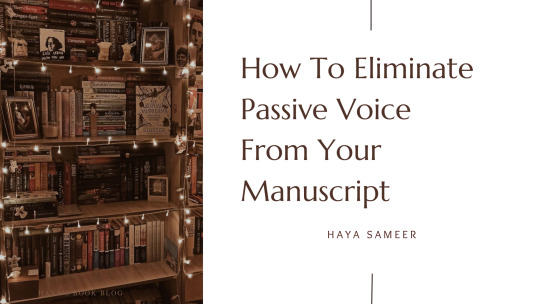
Welcome to my guide on eliminating passive voice from your manuscript! If you're striving to enhance the clarity, strength, and engagement of your writing, mastering the art of active voice is essential. Passive voice, while sometimes sneaky, can dull the impact of your prose and weaken the connection between your readers and your story.
In this blog, we'll delve into the intricacies of passive voice, providing practical tips and strategies for identifying and transforming passive constructions into active ones. Whether you're a seasoned writer looking to refine your craft or a beginner eager to strengthen your prose, this guide will equip you with the tools and knowledge needed to banish passive voice from your writing once and for all. Let's dive in!
Understanding Passive Voice
Passive voice occurs when the subject of a sentence receives the action of the verb, rather than performing the action itself. This often results in a sentence structure where the subject is being acted upon, rather than actively engaging in the action. Identifying passive voice can be tricky at first, but with practice, you'll become adept at recognizing its telltale signs.
Here are some key characteristics of passive voice:
Use of the Verb "To Be": Passive constructions often feature a form of the verb "to be" (such as "is," "was," "were," "has been," etc.) followed by a past participle. For example, "The cake was baked by Sarah."
Missing or Unclear Subject: In passive constructions, the subject that is performing the action may be omitted or downplayed, leading to ambiguity or a lack of clarity about who or what is responsible for the action.
Focus on the Object of the Action: Passive voice tends to emphasize the object of the action rather than the entity performing the action, shifting the focus away from the doer and potentially weakening the impact of the sentence.
Wordy or Indirect Phrasing: Passive constructions often result in wordy or indirect phrasing, with unnecessary words or convoluted sentence structures that can obscure the intended meaning.
By familiarizing yourself with these characteristics, you'll be better equipped to spot instances of passive voice in your writing and take steps to address them effectively. In the next section, we'll explore why passive voice can be problematic and offer insights into its impact on your writing.
The Pitfalls of Passive Voice
While passive voice has its place in certain contexts, overreliance on it can lead to several drawbacks in your writing. Understanding these pitfalls is crucial for refining your prose and ensuring clarity and effectiveness in communication.
Here are some reasons why passive voice can be problematic:
Obscured Responsibility: Passive constructions can obscure who is performing the action, leading to ambiguity or confusion about responsibility. This lack of clarity can weaken the impact of your writing, especially in cases where accountability or agency is essential.
Wordiness and Indirectness: Passive voice often results in wordy or indirect phrasing, adding unnecessary complexity to sentences. This verbosity can detract from the clarity and conciseness of your writing, making it more challenging for readers to follow and understand your message.
Reduced Engagement: Passive constructions tend to be less engaging than active voice, as they place the emphasis on the recipient of the action rather than the doer. This can lead to a passive or detached tone in your writing, diminishing its impact on the reader.
Weakened Verbs: Passive voice often relies on forms of the verb "to be," such as "is," "was," or "has been," which are less dynamic and descriptive than active verbs. As a result, sentences in passive voice may lack the energy and vividness that active constructions can provide.
Loss of Clarity and Precision: Passive constructions can obscure the sequence of events or cause-effect relationships in a sentence, leading to a loss of clarity and precision. This can make it more challenging for readers to follow the flow of your ideas or understand the intended message.
By recognizing these pitfalls, you can take proactive steps to minimize the use of passive voice in your writing and enhance the clarity, engagement, and impact of your prose. Now that you’ve understood how to identify passive voice and why you should eliminate it, let’s delve into strategies for correcting passive voice in your manuscript.
Converting Passive Voice to Active Voice
Once you've identified passive constructions in your writing, the next step is to transform them into active voice for clearer and more engaging prose. Here are some practical strategies and tips for making this conversion:
Identify the Doer of the Action: In passive constructions, the doer of the action is often either implied or omitted. To convert passive voice to active voice, start by identifying the agent or subject responsible for the action. This might involve rephrasing the sentence to include the doer explicitly.
Reverse the Sentence Structure: Passive constructions typically feature a subject that receives the action followed by a form of "to be" and the past participle. To convert to active voice, reverse this structure so that the doer of the action becomes the subject, followed by the verb in the appropriate tense.
Choose Strong Verbs: Active voice tends to use strong, specific verbs that clearly convey the action being performed. When converting passive constructions, select dynamic verbs that vividly describe the action and imbue your writing with energy and momentum.
Focus on Clarity and Directness: Active voice often results in clearer, more direct communication by placing the doer of the action at the forefront of the sentence. Aim for sentences that convey the action efficiently and effectively, minimizing ambiguity and confusion.
Use the Active Voice Checklist: Consider using a checklist to systematically evaluate and revise passive constructions in your writing. This might involve asking questions like "Who is performing the action?" and "Is the sentence structured with the doer as the subject?"
Rephrase and Revise: Don't be afraid to experiment with different phrasings and sentence structures as you convert passive voice to active voice. Be willing to revise and refine your sentences until they achieve the clarity and impact you're aiming for.
Maintain Consistency: As you revise your writing for active voice, strive for consistency in your stylistic choices. While active voice is generally preferred for its clarity and directness, there may be occasions where passive voice is appropriate or necessary for emphasis or rhetorical effect.
By applying these strategies and techniques, you can effectively convert passive voice constructions to active voice, enhancing the clarity, engagement, and overall quality of your writing. In the following section, we'll explore common pitfalls to avoid and additional tips for mastering the art of active voice.
Passive Voice Example:
Passive Voice: The decision to implement new policies was made by the executive board.
Active Voice: The executive board made the decision to implement new policies.
In this example, the passive construction "was made by" has been revised to the active construction "made," placing the executive board (the doer of the action) at the beginning of the sentence and making the sentence more direct and engaging.
Common Pitfalls and Mistakes to Avoid
While you're working to eradicate passive voice from your manuscript, it's important to be mindful of common pitfalls and mistakes that can inadvertently lead you back into passive constructions. Here are some key things to watch out for:
Overcorrection: Sometimes, in the eagerness to eliminate passive voice, writers may end up with awkward or convoluted sentences that disrupt the flow of their writing. Remember that active voice should enhance clarity and readability, not detract from it. Strive for balance and naturalness in your prose.
Forced Active Voice: Be cautious of forcing every sentence into the active voice. While active voice is generally preferred for its directness and clarity, there are instances where passive voice is appropriate and even necessary. Don't sacrifice meaning or coherence just to avoid passive constructions.
Ignoring Context: Consider the context and purpose of each sentence before deciding whether to change passive voice to active. In some cases, passive voice may be the better choice for emphasizing the receiver of the action or maintaining a specific tone or perspective. Always prioritize clarity and effectiveness in communication.
Neglecting Variety: Strive for variety in sentence structure and voice throughout your writing. Overreliance on either passive or active voice can lead to monotony and dullness in your prose. Experiment with different constructions to keep your writing engaging and dynamic.
Failing to Edit: Finally, remember that eliminating passive voice is an ongoing process that requires careful editing and revision. Don't expect to catch every instance of passive voice in your initial draft. Take the time to review and revise your writing, seeking out passive constructions and replacing them with active alternatives where appropriate.
By being aware of these pitfalls and actively working to avoid them, you'll be better equipped to craft prose that is clear, engaging, and free of unnecessary passive voice.
Resources For Eliminating Passive Voice
When it comes to refining your writing and eliminating passive voice, there are several resources and tools available to assist you. Here are some helpful resources to consider:
Writing Guides and Style Manuals: Many writing guides and style manuals offer comprehensive advice on grammar, style, and sentence structure, including tips for recognizing and eliminating passive voice. Examples include "The Elements of Style" by Strunk and White and "The Chicago Manual of Style."
Online Writing Communities: Engaging with online writing communities can provide valuable feedback and support as you work to improve your writing skills. Websites like Reddit's r/writing and platforms like Wattpad and Scribophile offer forums where writers can share their work, receive critiques, and learn from others.
Writing Workshops and Courses: Participating in writing workshops or enrolling in writing courses can provide structured guidance and instruction on various aspects of writing, including passive voice elimination. Look for courses offered by reputable writing organizations or taught by experienced writers and instructors.
Writing Software: Many writing software programs, such as Grammarly and ProWritingAid, include features that can help identify and correct passive voice in your writing. These tools can be especially useful for catching passive constructions that you might overlook during the editing process.
Grammar and Style Guides Online: Numerous websites offer free resources and articles on grammar, style, and writing techniques. Websites like Purdue OWL (Online Writing Lab), Grammar Girl, and The Writing Center at the University of Wisconsin-Madison provide clear explanations and examples of passive voice usage and strategies for eliminating it.
Writing Blogs and Podcasts: Following writing blogs or listening to writing podcasts can expose you to valuable insights and advice from experienced writers and industry professionals. Look for blogs and podcasts that focus on craft, style, and revision techniques.
Books on Writing Craft: There are many books dedicated to the craft of writing that offer practical advice and exercises for improving your prose. Books like "On Writing Well" by William Zinsser and "Bird by Bird" by Anne Lamott contain valuable tips for honing your writing skills and eliminating passive voice.
By leveraging these resources and incorporating them into your writing practice, you can develop a deeper understanding of passive voice and cultivate the skills needed to eliminate it effectively.
I hope this blog on How To Eliminate Passive Voice From Your Manuscript will help you in your writing journey. Be sure to comment any tips of your own to help your fellow authors prosper, and follow my blog for new blog updates every Monday and Thursday.
Looking For More Writing Tips And Tricks?
Are you an author looking for writing tips and tricks to better your manuscript? Or do you want to learn about how to get a literary agent, get published and properly market your book? Consider checking out the rest of Haya’s book blog where I post writing and publishing tips for authors every Monday and Thursday! And don’t forget to head over to my TikTok and Instagram profiles @hayatheauthor to learn more about my WIP and writing journey!
#hayatheauthor#haya's book blog#haya sameer#haya blogs#writers on tumblr#writer community#writer tools#writer blog#writer stuff#writer tips#creative writing#writers of tumblr#writerscommunity#writeblr#writing community#writer things#writing tools#writing stuff#writing#writing life#writing inspo#writing help#writing advice#writing inspiration#writing ideas#writing things#writing tip#author advice#author resources#author tips
168 notes
·
View notes
Note
As someone whose country went through a brutal dictatorship, we still see the bleeding wounds it's left- even 50 years later. The idea of not exercising the right to vote is absolutely unthinkable to most citizens. Granted, voting is obligatory, but everyone I know does it voluntarily and enthusiastically. The discourse I hear around it in the US evidences a narrow perspective, which is so upsetting to see, especially within leftist spaces.
The right to vote is something every citizen must, sadly, defend. Most Latin American countries know all too well what happens when fascism and treason disguised as conservatism take centre stage. I hope it won't be too late when the people peddling anti voting crap to younger generations realise the harm it causes.
All around the world, the reason fascist authoritarian dictatorships of whatever ideology stay in power is precisely either because citizens aren't allowed to vote, the vote is outrageously rigged (think of the 99% margins routinely racked up in places like Russia and Venezuela) or they rely on repressing the vote through intentionally disheartening liberal, left-wing, progressive, or other similarly oriented voters, who often do much of the work themselves with constant internal attacks and purity tests and adopting the rhetoric of anti-voting propaganda in the name of purity. Despite all their populist claims to enact a monolithic Will of the People, all these anti-democratic authoritarian movements are terrified of a genuinely representative popular vote and will do anything to stop it, because it turns out that if you give them the choice, people anywhere in the world don't super like being repressed, extorted, and terrorized in the name of Ideology, and will give your tiresome fascist ass Das Boot.
In the American context, the Republicans have gone full masks-off illiberal authoritarianism and they desperately hate the idea of people voting, which is why they have filed endless lawsuits, passed endless restrictive laws, disenfranchised even their own voters, shrieked election fraud, and everything else to try to jerry-rig their position as extremist minority oligarchic rulers for life. Which is why it is befuddling, to say the least, to see people insist that voting doesn't work, it doesn't matter that much, it isn't an effective tool against fascism, it's Morally Wrong, or all the other idiot "justifications" they come up with. All you have to do is look at how fucking terrified the bad guys are of a minimally equitable electoral system (such as getting rid of the Electoral College, which would pretty much ensure a Republican never won the presidency again if it had to be selected by -- gasp! -- an actual nationwide popular vote). That's why I don't even buy into the "voting sucks and is the bare minimum" rhetoric that gets peddled as a sort of tempting carrot to get the recalcitrants to do it -- don't worry, you can still post your mean tweets about Biden and that totally is more effective! Voting is A BIG DEAL. Voting works. Americans don't realize this because they are lucky enough to never have lived in a country where it wasn't available to be taken for granted and therefore scoffed off.
Voting, having the right to vote, and the large-scale ability that it confers to change the structures of society, is a MASSIVELY powerful tool that has largely not been available to most people throughout history (and is still unavailable to a large chunk of the world today). That's why there were bitter and protracted battles to get women and African Americans the right to vote in America. That is why the GOP still particularly targets those voters today, because the simple act of exercising your civic franchise in your best interests (and therefore not in the MAGA TrumpCult's interests) is so terrifying to them. If it was meaningless, none of this would matter. But it does.
Here, Imma make it real easy for you. If you have any reason to think your voter registration is lapsed, inactive, or nonexistent, if you have recently moved and don't know your status or your polling place or whether you get a mail ballot or whether your evil DeSantis governor has recently taken you off the rolls, or if you have never done it before, or if you want to do one basic thing to oppose fascism today, click this simple link. Do it.
136 notes
·
View notes
Text
Only Friends: Sand's Reaction to Ray VS Boeing
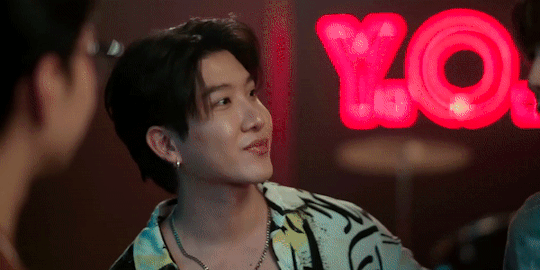
I know some people will be annoyed that Sand wasn't more forceful in telling Boeing to leave him alone. In my opinion, this isn't really surprising. Sand's biggest strength and weakness is his kindness. He'll make concessions for people, even those who hurt him. Ray is a prime example. Why would his ex be any different?
Boeing's Dubious Intentions
It's glaringly obvious just how uncomfortable, stiff and exasperated Sand's body language is during their second exchange. This is someone he shared his ultimate dreams and passions with, which must have made the betrayal even more devastating. We still don't have the full context as to how this all went down, but I'm sure Sand hasn't forgotten that Boeing chose to leave him. Compared to their first re-encounter where Sand appears rattled and somewhat flustered, here he seems to display a more resolute lack of patience, possibly after reminding himself of Boeing's true colours.


This doesn't erase the fact that Sand had feelings for him once, cared about him once. Sand didn't choose to end the relationship, Boeing did. So there would have been unresolved feelings that Sand had to process alone in the aftermath. For Boeing to have the audacity to swan back in rightly warrants a less than lukewarm response.
Even so, Sand shows Boeing an incredible amount of grace when he certainly doesn't have to. He tries to calmly but firmly ward Boeing off. "State your business". "Just forget it. I don't think I'll go." "Just friendship. That I can give you." He makes it very clear that Boeing can find him at the bar but nowhere else. He's trying to establish a distinct boundary, which Boeing swiftly disregards.
Sand's Unease: Where Past & Present Collide

The way Sand is reacting says to me he desperately doesn't want Ray involved. He seems eager to keep him well away from Boeing. Sand could have chosen not to mention his ex's sudden reappearance, but decides to be upfront with Ray about it. I think Sand's turmoil is a sign of worry over what Boeing may do, rather than an indication of indecisiveness over his own feelings. The reason I say this is because Sand doesn't show any warmth, residual affection or happiness in seeing Boeing again. He looks mostly wary, unnerved even.
I can also see why Sand would try to refrain from openly displaying his feelings for Ray in Boeing's presence. If he exhibits just how much he cares about Ray, whose to say whether Boeing may pull another stunt like he did with Mew/Top and try to pursue Ray instead just to be messy. The way Sand looks at Boeing is laden with suspicion and uneasiness, particularly when Ray is around. This is really noticeable when Boeing first addresses Ray - Sand's whole demeanour gets much colder and standoffish.



We don't know precisely what Sand is afraid of - that Boeing may target any ill will at Ray? Or that Ray may be affected by his ex flaunting details about their history which could cause jealousy? Things are going really well between Ray and Sand right now but it's possible Boeing could try to stir up a misunderstanding or create conflict between them.
Ray's Protectiveness: "Deal with him or I'll do it."
Ray knows better than ever what Sand is like. He's all too aware of just how painfully kind and caring his boyfriend can be, often to his own detriment. Boeing is keen to exploit this very fact by trying to appear imploring towards Sand, "You never yell at me." Ray is also acutely familiar with how Sand struggles to say no to those he cares about.
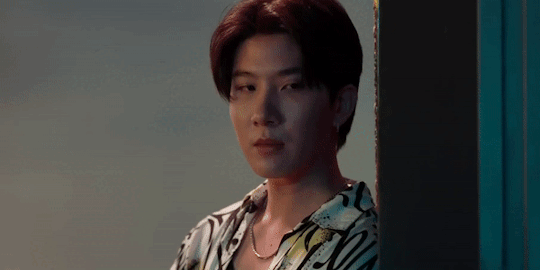

Whilst Ray observes angrily, I like to think this comes from a place of being mad for Sand more than anything. If he's seen their entire interaction play out, he'll notice that Sand has not once initiated physical contact with Boeing. He doesn't shirk him off, but he certainly doesn't respond either. He keeps his arms firmly planted at his sides, and yet Boeing keeps trying his luck. Something about the way Boeing behaves with Sand feels like he treats him as a plaything - someone he used to have wrapped around his finger. Perhaps he thinks that the power he used to have over Sand still remains.
Sand's expressions also feel loaded with shame, as if he's repeatedly chiding himself for being foolish enough to love someone like Boeing, who so cruelly tossed him aside. That somehow he feels partly to blame. Maybe this is a Sand he doesn't want Ray to see. Yet here Ray is, on the side-lines, taking all this in.

From their very first interaction, Boeing is trying to undermine Ray. You can see Ray's growth as he doesn't confront or make a fuss, but chooses to respect Sand's wishes and instead stays quietly hidden to keep watch. He looks to Sand for confirmation he'll be okay on his own before leaving. Though he can detect something isn't right, he allows Sand the opportunity to handle this first.
As soon as he sees Boeing trying to cross a line, he steps in. He's not going to permit Boeing trying to drag Sand off somewhere alone, he'd rather keep the enemy directly under his nose.


What I'm hoping to see in Episode 12 is protective Ray to come out full force. I've said this before but the entire series has been Sand looking after Ray. Whereas this would be a great opportunity for Ray to look out for Sand, and to teach Boeing a lesson at the same time.
That eye contact in the last scene was so loaded. Ray's gaze is a silent threat- 'That's my man you're looking at, don't get used to it. If you're really stupid enough to try anything on my watch, I'll tear your neck out.' Don't ever underestimate Ray, he's small but feisty.
#only friends#only friends the series#ofts#only friends meta#ray x sand#sand x ray#khaofirst#firstkhao#first kanaphan#khaotung thanawat#seriously though what is this man's deal??#he's giving lowkey sociopath and stalker#an actual creep#me: do NOT touch sand keep your filthy hands off him
215 notes
·
View notes
Note
Hi, I just saw a "which historical event would you time travel back to" poll and it got me wondering: if time travel were possible, would you consider it ethical (in an academic context) to do so? Assuming it was possible to in some way mitigate the chances of accidentally interfering with past events, do you think time travel would be welcomed as an indispensable tool for historians or would the risk of changing the past be seen as too severe to allow for time travel even with mitigating efforts? Do you think there would be other ethical implications in time travel for academic purposes? Would time travel even be seen as a useful tool at all, given that history is about so much more than simply confirming the accuracy of historical facts?
I guess my thoughts are that time travel wouldn't actually change that much in most cases, as we would still just have people arguing about the importance and meaning of a slightly more accurate set of facts than we had access to before, but I am not a historian so I thought I'd ask your opinion.
Hope you're having a smashing day,
C
I would not consider it ethical - either academic or otherwise, no. We have no right to go back and observe people's lives like they were exhibits. It is one thing for someone to see an artefact in a museum, it is quite another to go back and intrude on the lives of the dead while they still live it.
The purpose of studying history is to seek to understand what went before us. That's part of the fun - the discovery, the research, the comparing of sources. It is in the finding out, but also knowing that we cannot know everything that many seek to find themselves. An invention, such as time travel, would rather negate a lot of these aspects. Yes, we can all imagine what it would be like to go back and witness major historical events, but we are not supposed to be there.
Ethically, the question is not 'can we safely mitigate the consequences?' but 'what right do we have to do this in the first place?'. We simply don't. I cannot imagine a world where anyone has the right to go back to any private moment of any individual in history and spy on it for information. We seek privacy from online advertising spies in the modern day. We hide our lives, or use tools to confuse their data harvesting. Yet we would not give those who have gone before us that respect? Further to that end, once it was implemented people now would start to find ways around being sought by such technology so if someone wished to go back to pry into their personal lives, especially unguarded moments where they were not around anyone.
Any such implementation of it would have to account for not the 'what good could we do?' but instead the 'what chaos could be wrought?' People, more often than not, do not use technology in the way that it ought to be used. There is far more risk of people using such a thing for their own ends and ill deeds, than there ever would be in knowing the precise play by play moments of a major historical event. It's not a historian you'd have to worry about in this scenario, it's the tech bro who wants to win an argument on the Deceased Monty Python Avian Sketch App, because we all know the technology would never be allowed to stay within the purview of academia.
It would change everything of the study as we know it. Instead of arguing over what's left, we would be subjected to the invasion and potential change of what it was. If such a thing were ever implemented I would quite frankly be horrified at how far the field of study had fallen.
107 notes
·
View notes
Note
Now you mentioned i, I am a bit surprised Smallville is prominently and consistently in Kansas? It's Smallville, Kansas. There might be others and certainly cities located vaguely within a real region, but it's definitely the first fictional town or city of D.C. in a real-world American state to come to mind.
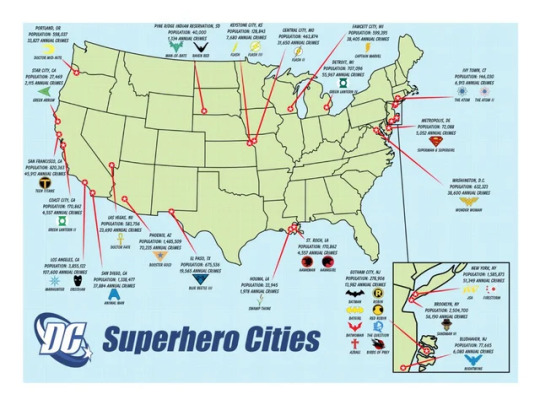
So this gets to the weirdness of D.C geography. When Superman was first established, there was much less of a cohesive "universe," so if Siegel and Shuster wanted Superman to specifically be raised in Kansas, that's where he was from and the rest of the geography would have to work itself out.
IMO, this early slapdash approach to world-building has (over time) led to some things that just don't make sense to me as a student of urban history and urban studies:
Metropolis shouldn't be in Delaware. It doesn't make sense in terms of urbanization, given the context of an already-crowded Northeastern Corridor - Delaware simply does not have the capacity to sustain a city of 11 million people, and you wouldn't get a municipality of that size right next door to New York City (as well as D.C's other fictional cities in the area). The whole idea of Metropolis and Gotham being across the river/bay from each other has never really worked for me; you can still do Superman/Batman team-up stories no matter where they are, because Superman can fly and Batman has his own personal fighter jets.
More importantly, it doesn't make sense in terms of historic patterns of urban migration. Moving to the big city in search of the American Dream is a big part of the Clark Kent story, but historically people moving from rural to urban areas overwhelmingly go to the nearest large city, depending on how transportation networks are arranged, whether we're talking about train lines or direct flights or highways or bus routes. There is a reason we can track regional movements of black communities during the Great Migration, because who went where depended on which train lines ran through which states:

This is why I've always felt that, while Metropolis has aesthetically been associated with New York City, it logically should be Chicago. It is the biggest city in the Midwest, one very much associated with robber baron industrialists and corruption at the highest levels, and absolutely stuffed with art deco architecture for Superman to pose on top of. Up until the Tribune Company began to strip it for parts, it's also been a major newspaper town with a long tradition of muck-raking investigative journalism that would inspire a starry-eyed cub reporter like Clark. As one of the original transit hubs and the U.S' own "nature's metropolis," it is precisely the place that a Kansas farm boy would hop a train to, because all trains go to Chicago. Also, culturally I like it better that Clark Kent represents the City of Wide Shoulders whereas Bruce Wayne is the typical Tri-State Area Type-A personality.
Going back to D.C's bizarro Northeast geography, I likewise have an issue with Gotham being in New Jersey...if New York City is also supposed to be a major metropolitan area in the D.C universe. Just as Delaware would struggle to support a city of 11 million people, it would be very difficult to grow Gotham into a city of 10 million people so close to the gravity well of the Greater New York Metro Area. New Jersey is a pretty urbanized state, but its biggest cities tend to range in population from 300,000 to 100,000 - which works very well for a place like Blüdhaven, which is supposed to have something of an inferiority complex vis-a-vis Gotham - because a lot of the population tends to gravitate to NYC for work and eventually housing as well.
I've already said my piece about the lack of cultural specificity of D.C's Midwest.
As far as the West Coast goes, I've always found it a bit odd that Star City isn't where Seattle is supposed to be. Let's face it, the only place where Oliver Queen's facial hair would go unnoticed is Seattle. Also, Coast City is often depicted too far north on the map - if it's supposed to be a half-hour away from Edwards Air Force Base, it should be significantly more southern, down by Kern County and San Bernadino County, not practically up in San Francisco.
#dc#dc meta#the world outside your window#urbanization#urban studies#urban migration#urban demographics
95 notes
·
View notes
Text
The Languages and Linguistics of Middle Earth
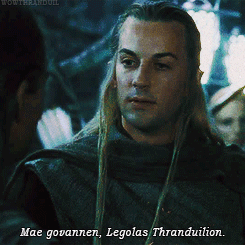
Gin suilannon!
In the context of my minor programme in Celtic studies and languages, I am following a course called From Táin to Tolkien and Beyond, and today, we had a guest lecture about the languages of Middle Earth, more particularly Sindarin. Since it might be useful to some of you (out of curiosity or for your fanfictions), I thought I would share my notes and my conversations with the guest lecturer here.
This was a very linguistics-driven lecture, so I will try to add explanations where I can and, hopefully, make the information more accessible. If you have any questions, you can react to this post or DM me! And beware, this is a very long post.
So, without further ado, here is what I learnt.

✽ Notes on Historical Linguistics, Manuscript Tradition and the Languages of Tolkien's Middle Earth by Dr. Aaron Griffith
✣ Shared histories of languages and manuscripts are often visualised with tree diagrams to see the evolution and how they branch out
✣ Little material was published about Middle-Earth and the Elves during Tolkien's lifetime
-> Most of it is part of the Legendarium
-> Main periods of writing (here we only mentioned the writing processes or when a project was finished, not when they were published):
- The Lost Tales (1916-1926): infancy of the Elvish languages
- Sketch of The Silmarillion (1926-1930): revision of The Lost Tales and some changes brought to Elvish
- Quenta Noldorinna (1930): further reworking and significant expansion of the sketch
- The Hobbit (1933): originally intended as an unrelated story
- Quenta Silmarillion (1937): fullest expansion of The Lost Tales and significant refinement of the languages
- The Lord of the Rings (1950s): use of the mythology of all the earlier writings as a basis, reworking of the languages and massive changes in their interrelations
- The Silmarillion (post-1948): based on Quenta Silmarillion, which was heavily revised after The Lord of the Rings
✣ Tolkien rarely dated his works and compositions, so it is difficult to establish a precise creative process or linear chronology of the changes brought to Middle Earth. However, he did leave us some clues:
- Absolute Dating -> occasionally, Tolkien did attach dates to his manuscripts, but it remained a rare occurrence
- Relative Chronology -> some compositions are dependent on changes to earlier works, so a logical chronology can be estimated (this can also be made possible by the scrap papers from Tolkien's personal records and drafts)
- Handwriting -> can be misleading, but it can be a helpful tool to date pieces of distinctly different chronological layers
- Nomenclature -> Tolkien frequently changed character names, so particular names can be matched with letters and extracts in which they appear
- Christopher Tolkien -> his manuscript order from the twelve-volume The History of Middle-Earth series
✣ Critical asymmetry -> languages frequently split into dialects and other languages of their own, but when manuscripts are retraced according to their version of the same text (think of Arthurian romances and oral tradition being recorded at different points in time and therefore presenting different themes or characters), narratives (stories) cannot be regrouped as easily
-> However, there are 2 relations between stories and languages:
1. How changes can propagate in a language system or narrative tradition
2. The relations of language families in real- (at the time of composition) or book-time (time as it passes in the stories)
✣ In natural language, change moves forward in time. This is a trend which also applies for errors in manuscript copies (irregularities in tropes, character changes, etc.)
✣ In stories, a plot development can be carried forward just like a sound can evolve in a language. However, change can occur backwards, too. For example, if a character's ancestry is modified, this can change the whole manuscript history of the story being written (by this, understand that the story must be readapted to fit the new information to maintain some consistency).
✣ Historical linguistics is concerned with the study of language change and the formation of language families (Romance languages, Germanic languages, Slavic languages, etc.). It does so by examining and comparing systems from different languages to see if they can be retraced to an original, common system (Welsh and Irish stemming from Proto-Celtic, for instance).
✣ Some of Tolkien's languages were intended to be related. The following languages and dialects are related in a clear, 'historical' structure, which mimics the way that languages evolve in our world:
- Quenya
- Sindarin
- Lindarin
- Noldorin
- Telerin
- Doriathrin
- Ilkorin
✣ Elvish languages were constantly revised by Tolkien, making it challenging to determine a single 'history' (or creative process) of Elvish tongues. In their case, it is more accurate to speak of a series of histories or continua, which refer to the times at which Tolkien brought significant changes (often 1916, 1937 and post-1948). A tree diagram is thus no longer fitting to visualise them all. The diagrams overlap in a three-dimensional visualisation instead, with each layer representing the changes of each major revision.
✣ Some changes were brought solely for aesthetic purposes. Tolkien found the phonetics of Welsh and Finnish particularly pleasing to the ear and, therefore, based Sindarin and Quenya on their structures. As you probably already know, these are the two most-developed languages in the lore of Middle Earth, but he fleshed out at least four other Elvish languages (Telerin, Ilkorin, Doriathrin and Danian). There were generally more changes in Quenya (abbreviated Q).
✣ What was originally Noldorin (abbreviated N) in the 1916 and 1937 versions is now Sindarin (abbreviated S). After 1948, Noldorin became a dialect of its own, and its place in the language tree shifted. The terms and grammar remained rather consistent from one version to the next.
-> example:
1916: N Balrog 'fire demon' (bal- 'anguish' + -róg 'strong')
1937: N Balrog 'fire demon' (bal- 'torment' + rhaug 'demon')
1948: S Balrog 'demon of might' (bal- 'might' + raug 'demon')
✣ Such modifications reflected the major changes brought to the stories (especially to what we now know as The Silmarillion), but they also mirror the natural linguistics evolution of real-life languages. This causes a problem, namely in the emergence of 'linguistic orphans', or words whose etymology was no longer valid because the linguistic or sound laws that birthed them in the first place were removed.
-> example: Eärendil (Q 'lover of the sea', ayar- 'sea' + -ndil 'lover')
1916: eären was the genitive form (or possessive form) of eär, so the compound made sense.
1937: eäron replaced eären, but Tolkien remained particularly attached to the previous version because of the Old English éarendel -> this created a disruption in etymology, so he declared that eär/eären meant 'sea'
✣ Major sound changes introduced with The Lord of the Rings
✣ Tolkien introduced lenition in some grammatical cases. In Celtic languages, it is a rather common occurrence. It consists in the softening of a consonant at the start of a word according to certain rules. For example, the sound [p] is softened into a [b]. My knowledge of Irish is non-existent, but it is something which happens in Middle Welsh (c.1100-c.1400) and Modern Welsh.
-> example: before 1972, Tolkien suggested that the name Gil-Galad ('star of brilliance', 'brilliant star') was lenited, which means that the second component of the name stems from the word calad (lenition causes the c to soften into a g).
-> However, he stated in a letter in 1972 that lenition no longer occurred if 'the second noun functions as an uninflected genitive' (in other words, that the possessive is not marked with an apostrophe, 'of the', or any other marker that applied in Sindarin). This explains the merging of ost 'start' + giliath 'fortress' into Osgiliath 'fortress of the start'. If giliath was lenited, the name would instead be Osiliath or Ostiliath (when lenited, g disappears at the head of the noun).
-> There is one noted inconsistency regarding the 'rule' above, and it is the case of Eryn Vorn 'Dark Forest'/'Forest of Darkness'. Eryn is a plural form of oron 'tree' and morn acts as a noun (but it is usually the adjective for 'black, dark' and morne is the noun referring to 'darkness, blackness'). Due to Welsh vowel change rules in certain plural forms, morn becomes myrn, and this very same plural form should accompany eryn (both adjective and noun adopt a plural form). Instead, we find a singular form of morn which is lenited (m becomes v). This is possibly an error accidentally left in by Tolkien.
✣ The nature of Noldorin/Sindarin makes Elvish languages rather realistic in their evolution compared to real-life languages, because irregularities occur. Dr. Griffith argues that languages naturally show irregularity because of gradual changes and borrowed words, but he acknowledges that accidents are sometimes just that. Accidents.

✽ Notes on the lecture by Dr. Aaron Griffith
✣ A general interest in creating new languages emerged in the 19th century. It was believed to be a tool which could help resolve political conflicts by creating a sense of cohesion and avoiding miscommunication. This is evident in the creation of Esperanto.
✣ In most cases of invented languages, the language was invented first, and the world or context they belonged to was formed from there. Tolkien worked exactly the other way around.
✣ Tolkien aimed to create an English myth, because he considered that England lacked its own mythology. King Arthur is generally considered Celtic in essence (possibly Welsh) and therefore could not apply as an English myth. This could explain why he retained the Gregorian calendar throughout The Hobbit and The Lord of the Rings. It served as a familiar bridge between Middle Earth and England/the real world.
✣ In original maps of Beleriand, there used to be land west of Ered Luin (the Blue Mountains northwest of the Shire). This was changed in later maps, which Tolkien designed and drew himself. Often, Arda was depicted as a globe with several continents. Afterwards, Tolkien decided that Arda was, in fact, flat.
✣ Backstory of the Elves (I have no knowledge of The Silmarillion, so if I did not use the right terms or names, please feel free to correct me!):
- Elves first came into existence in Cuiviénen and were invited by the Valar to join them in Valinor, meaning that they had to cross the continent and the ocean
- Not all Elves made it to Valinor, however. Some decided to separate from the main group and settled in different areas of Middle Earth, like in Greenwood (later known as Mirkwood). This caused the language they spoke to evolve into different dialects and, sometimes, completely separate languages
- Elves returned to Middle Earth after the war against Morgoth (S; Q Melkor), aided by Númenorians
- The West was physically separated from the rest of Arda by a 'cut' through the ocean. The gods then shaped Arda into a globe, but once past the portal to the Undying Lands, it was flat again.
✣ Most often, Tolkien did not provide translations of the phrases he peppered into his works, mostly because he believed that nobody would be interested in them. Once he received enthusiastic letters from readers, he decided to attach them to later versions. He did regret publishing the appendices of The Lord of the Rings, however, because the changes felt too 'final' and he felt as though he took away his own liberty to make further revisions to the material (once it's published, you cannot go back).
✣ Tolkien created quite a lot of poetry to match the phonological aesthetics of Sindarin and Quenya.
✣ Outside The Lord of the Rings, the longest source we have in Sindarin is The King's Letter, which was originally supposed to be part of the epilogue in The Return of the King but was not in the final version because he wrote it in the 1970s. In this letter written entirely in Sindarin, Aragorn (then King Elessar) invites Sam, Rosie, and their children to visit him and Arwen in Minas Tirith.
✣ Sindarin grammar is tricky to reconstruct because of the lack of sources on the matter and the complicated grammar revisions that Tolkien brought. However, we do know that it is loosely based on Welsh, which he confirmed in 'English and Welsh' in The Monsters and the Critics (published posthumously in 1983). He aimed to recreate the same 'pleasant' sounds that he found in Welsh for Sindarin. If the reader knows how to pronounce the Welsh alphabet, then they can easily pronounce Sindarin.
✣ Secondary sources on Sindarin:
- A Gateway to Sindarin by David Salo. Salo worked as a language consultant on the films, but his book has been criticised by Tolkien scholars because it tends to ignore the changes between 1937 and 1948 and it treats Noldorin as a dialect of Sindarin, which is no longer the case from 1948 onwards.
- The Languages of Tolkien's Middle-Earth by Ruth S. Noel
✣ Primary sources are very incomplete, but the main ones we can use to observe the language are the following publications:
- The Lord of the Rings
- The Lost Road and Other Writings
- The War of the Jewels
- The Peoples of Middle-Earth
✣ As established in the previous section, Sindarin follows some of the grammatical rules present in Welsh and pre-modern Welsh. We encounter mutations, especially lenition (also called 'soft mutation' because of the sounds becoming softer, e.g. p becoming b), and they play a crucial role in the structure of Sindarin. Below is a comparison of soft mutation/lenition in the context of Welsh and then in Sindarin.
-> Welsh: dyn 'man' + teg 'attractive' = dyn teg 'attractive man'
merch 'girl' + teg 'attractive' = merch deg 'attractive girl' -> soft mutation after a feminine noun, t is softened into a d
-> Sindarin: Perhael 'Samwise' (literally 'half-wise')
Berhael 'Samwise' -> lenition when used as a direct object in a clause, p softened into a b
Carm Dum 'Red Valley' (capital of Angmar) -> uses tum 'valley', but it is lenited when acting as an adjective or an adverb, t softened into a d
✣ Other forms of mutations exist in Sindarin, but this part of the lecture is quite technical and does require a basic knowledge of Welsh or Middle Welsh to be comprehensible. Feel free to message me if you wish to know more about them.
✣ Mutations arose from sound changes that affected phrases (intonational units). In other words, they are groups of words that have a single principal accent (or stress) to fluidify the manner of speech and convey a sense of emphasis. For instance, not every word is stressed separately in the sentence 'I am going to the supermarket'. The stress is applied by the speaker to highlight their meaning. Is 'I' emphasised to insist that it is 'I' who is going to the supermarket? Is 'supermarket' stressed to insist that it is the supermarket that I am going to, and not another location?
✣ Mutations are inherited from Welsh and its earlier forms. The same is true between Pre-Sindarin (or what Tolkien then referred to as Noldorin) and Sindarin.
-> Welsh: atar evolved into adar 'bird' (lenition of t into a d)
-> Sindarin: atar evolved into adar 'father' (same pattern)
✣ No cases in Sindarin verbs, unlike in Quenya. This means that there is no Nominative, Genitive, Dative or Accusative.
✣ Like in Welsh, again, some plural forms of nouns involve what we call a vowel change. This means that according to a regular pattern, the vowels contained within a noun are not the same between their singular and their plural forms. In Sindarin, the vowel change and suffixes help to mark plurals. As far as I'm aware, the changes are identical in Welsh, so if you wish to use Sindarin in your own work, have a look at the vowel changes rules and you should be able to form your own plurals. Please note that it occurs with both non-final and final syllables.
-> examples:
- adan 'man' -> edain 'men'
- certh 'rune' -> cirth 'runes'
- annon 'gate' -> ennyn 'gates'
- amon 'hill' -> emyn 'hills'
- mellon 'friend' -> mellyn 'friends'
- Dúnadan 'Man of the West' -> Dúnedain (u is not affected)
✣ Suffixes are another way to mark plurals.
-> examples:
- harad 'south' + rim 'multitude' = Haradrim 'Southrons, Men of the South'
- hadhod 'dwarf' + rim 'multitude' = Hadhodrim 'Dwarves (as a race)'
✣ Compounds are common as well.
-> example:
- morne 'darkness, blackness'/morn 'dark, black' + ia 'pit, gulf' = Moria

✽ Questions I asked Dr. Griffith directly and his answers
✣ Q: In your article and in the PowerPoint presentation, you sometimes mark terms with an asterisk first (e.g. *rokko-khēru-rimbe when you discuss the origin of the term 'Rohirrim'). What does this notation refer to?
✣ A: An asterisk before a form means that it is not actually found anywhere, but we assume it must have existed. In this case, *rokko-khēru-rimbe is the form of Rohirrim as it would have been pronounced in Old Sindarin, but we don't actually have the word anywhere in a written text
✣ Q: For Rohirric/Rohanese, we know that the language that Tolkien based it on was Old English and that terms were directly borrowed from it (e.g. grīma 'mask' or þeoden 'lord, prince, king'), or that names and phrases from Beowulf have been peppered in the lore of Rohan (e.g. Éomer is a character mentioned once, and the first line sung by Miranda Otto in the 'Lament for Théodred' is a line from Beowulf as well). Unfortunately, it seems that the sources on the languages are few, but do we know his reasoning or process in tweaking and applying Old English to create Rohirric/Rohanese? Do we know, perhaps, how the grammar differed from Old English?
✣ A: We don't really know anything about the language of the Rohirrim. Tolkien chose Old English as a sort of cipher. What I mean is: the language of Middle Earth is called Westron, and the Rohirrim spoke a very archaic dialect of it. Tolkien represented this by having them use Old English/archaic forms. He talks about this in one of the appendices to The Lord of the Rings, though I don't remember which one.
✣ Q: In your opinion, is it realistic to compose texts in Quenya or Sindarin, considering that we do not really have a cultural context behind them that is fully explicit? By this, I mean that since idioms and certain concepts are intrinsically tied to their cultural context, is it possible to actually use the Elvish languages to compose new texts altogether?
✣ A: It is possible to compose texts in Quenya and Sindarin. People do it. Obviously, some things are simply impossible to know: how would you say 'computer' or 'shopping mall'? And for other things, we cannot really know since only Tolkien really had the 'true understanding' of Elvish languages and cultures necessary for some text production. That said, people do do it. I don't know much about it, though, I'm afraid.

For those who are interested, I have Dr. Griffith's article, the PowerPoint presentation with sources and vocabulary on it, as well as a handout with Noldorin and Old Noldorin. Dr. Griffith also sent me some extra sources, let me know if you want me to send them to you!
If you have questions, I can always try to contact Dr. Griffith again, he is the coordinator of my Middle Welsh course, so I'm bound to bump into him again, and he is genuinely excited to discuss all things Tolkien :)
@konartiste @from-the-coffee-shop-in-edoras @lucifers-legions @emmanuellececchi @hippodameia
#Tolkien#Elvish#Elvish languages#Sindarin#Quenya#Noldorin#linguistics#Middle Earth#Lord of the Rings#LOTR#Tolkien's linguistics#masterpost#reference#lotr ref
99 notes
·
View notes
Text
"Rule Britannia is out of bounds" - How England invented Great Britain
("Rule Britannia is out of bounds"- Life on Mars, David Bowie, 1971)

As promised, here is a more in-depth exploration of Wales' relationship to indigeneity or colonised status. And how England created the (political) concept of Great Britain when it formally annexed Wales in 1542. This is a long post but I will try and be brief where possible to do so. I graduated with a degree in Celtic Studies last year from Aberystwyth University so it's time to put that to use.
In my last post, I went over the groundwork for this conversation - so if you haven't read that one yet I strongly suggest you read that one first then come back to this one. In that first post, I establish the stickiness in claiming or applying the status of colonised onto the modern nation and people of Wales. I also explore how claims of indigeneity (intended to legitimise Welsh nativism through dubious claims of descent from the Iron Age Britons) are weaponised in modern political contexts.
With all that said - how does one categorise the suffering of Wales/its culture and language without straying into the language of the colonised?
Early Medieval English Imperial desire for Wales:
Very often, you will hear people make the claim that Wales was 'England's first colony' and that the other nations bordering England were guinea pigs for Britain's later colonial empire. My previous writing on this topic has established the difficulty in applying colonised as a term to Wales and its context. Which leads to the question of what do we describe it as instead?
For this, we need to make a distinction between colonialism and imperialism.
The two concepts are very similar (and do overlap slightly) but they have crucial differences which allow us to be more precise and succinct with our wording which aids both communication of the subject and quells misunderstanding through language which doesn't fit the situation.
Put simply, Imperialism is when one country, people or nation desires to extend power over another (usually a close-by or neighbouring territory) - especially (but not solely) through the means of expansionism.
Colonialism is also when a country, people or nation wants to extend power over another - but primarily through invasion and typically (but not always) against territories that are further afield and not immediate neighbours).
A lot of the way in which we view early British history in Wales is tinged with a kind of exceptionalism for what happened between England and Wales. Very often, what was done is framed as uniquely terrible for the time and held up as a poster child for the unique evil of England's expansionist desires. Yet all over Europe at the same time this was happening - other European nations and peoples were engaging in the same subjugator-subjugatee relationship. The exceptionalism present in framing Wales as uniquely suffering in this period is, unfortunately, borne out of the same British imperial culture which was thrust upon it and has become irrevocably entwined with culturally. It is a kind of British arrogance (which ironically crops up in anti-British arguments in Welsh independence activism) which presupposes nobody could have suffered the same or worse than they have, which demands the active ignorance of other, contemporary examples of that which they claim to oppose.
Wales was the first victim of English (later British) Imperialism - not its first colonial victim.
The build-up to and annexation of Wales by England:
Wales was annexed twice - once before the age of states and once shortly before that age dawned. The concept of states (as in, sovereign countries) didn't really exist until after the Treaties of Westphalia (1648). In which the concept of non-interference in the religious affairs of other countries (and other domestic affairs) was established and international relations was born. This is relevant to Wales' situation - as what England did to Wales happened long before the age of states began.
There was the Conquest of Wales by Edward I between 1277 and 1283. (Before that, the Norman Conquest of Wales by 1081). (However, the latter being conducted by the Normans is not necessarily equatable to the actions of England the country, which itself had only just been invaded by the Normans). And then the Laws in Wales Acts which formally incorporated Wales into the realm of the Kingdom of England in 1542.
The Conquest of Wales by Edward I overran the territories of the last Prince of Wales (from the Welsh monarchic tradition), Llywelyn the Last and divided the territories into Welsh Principalities and Marcher Lordships. This setup remained until 1542, when Henry VIII passed the Laws in Wales Acts and formally annexed Wales and made it (in all the legal senses) a part of England.
By the time international relations was in its infancy (i.e. shortly after the Peace of Westphalia) Wales had been absorbed into England for just over 100 years. The relevancy of this is that Westphalia had been about religious liberty - Henry VIII's incorporation of Wales into the Kingdom of England was partly informed by religion. Henry VIII had just broken away from Rome and established the Protestant Church of England, whereas Wales was still largely Catholic. The Laws in Wales Acts also replaced the language of the courts in Wales with English, cutting off monolingual Welsh speakers from legal representation. The language of worship became English instead of Latin. Wales was culturally assimilated into England over a long period of time. And that meant ensuring Wales followed the 'correct' religion and spoke the 'correct' language. After the Peace of Westphalia, these actions by Henry VIII to bend Wales to his new religion and to assimilate Wales into England would have been in poor taste or decried in light of the new Westphalian system that was developing in Europe. Alas, these events took place before then and temporally speaking, Wales was locked out of this recourse.
By contrast, Scotland was unified with England into the Kingdom of Great Britain in 1707 (after the Peace of Westphalia). England committed numerous acts of cultural erosion and destruction against Wales and Scotland at this time - but its Union with Scotland differs to that with Wales. Wales was incorporated into England, whereas Scotland was 'invited' to join a union between England (which then included Wales) and itself. Simplifying it greatly - like a marriage proposal in which the two spouses are *supposed* to be equals. After the Act of Union with Scotland, the whole island of Great Britain was 'unified' and thus the Kingdom of Great Britain was formed from two states - England (inc. Wales) and Scotland into one state.
Welsh Nationalism and Nationhood as separate from Statehood:
Wales and Scotland were the victims of English imperialism in many similar, but also many different ways.
Wales, having never been a 'state' was unable to acquire this status since it had long been incorporated into England by the time the concept of states had developed. Wales was unlucky in this way, because other nations on this island such as Scotland had managed to establish themselves long enough to survive into the age of states and thus became one. Because of this, Welsh nationalism cannot look to an era in which it was a free state because that did not happen. Instead, Welsh nationalism very often looks back with rose-tinted spectacles to Wales prior to Edward I's conquest and/or prior to Henry VIII's Laws in Wales Acts.
But nationhood and statehood are not the same thing - and it is the conflation of these two concepts (like the conflation of colonialism and imperialism) which has led to much of the confusion on these topics. Nationhood is acquired by a group of people who share several of these things: a common language, history, culture and (usually) territory. Not all of these things are required, but most nations have all or almost all of these qualities. Wales has a language (Welsh), a common history, culture and territory (Wales). Statehood is acquired by an association of people who have most or all of these things: formal institutions of government, laws, permanent territorial boundaries and sovereignty. Wales before 1283 very loosely had government and laws (monarchy and Laws of Hywel Dda) but had no permanent territory due to the conquest and lost some sovereignty in 1283 and total sovereignty in 1542.
Even if Wales had met all the criteria for a state in 1283, it would not have been eligible to become one - no nation in the world was able to do that yet because the concept (or proto-concept) for it would only be invented in 1648. Even England did not qualify for state status yet. Put simply, Wales got very unlucky with history and geography in such a way which prevented it from having a historical statehood post-1648 like neighbouring England and Scotland.
Naturally, when Welsh nationalism attempts to recall a past in which it was a 'state' - it is always an imagined and romanticised history. A fantasied history which generates ideas of the persecuted 'indigenous' Cymro where it shouldn't really be (in all seriousness, the injustices inflicted upon Wales by England are enough - extra additional injustices reliant upon a claim to to 'nativeness' do not need to be invented in order to be taken seriously). In the modern world, claims of nativeness in a European context are fraught, misguided, in poor taste and often copy the homework of the indigenous peoples those same European powers marginalised or colonised. In the modern world, a white Welshman claiming indigeneity is doing so in a postcolonial world and there really is no escaping that. Succinctly - the Welsh nationalist who relies upon a created sense of nativeness can only do so by drawing upon the work of marginalised native peoples living in parts of the world formerly colonised by Great Britain. To claim native status as a Welshman is to misunderstand and misappropriate history while wielding the language of the genuinely colonised while contributing nothing to it. It is purely extractive and a slap in the face of non-European native peoples everywhere. The pining for this return* to a prior point in Wales' history where it was a fully functional, sovereign nation populated only by 'native' or 'indigenous' Cymry is an alarming and ahistorical fantasy that all too easily slides into ethnonationalism and nativism -ancient or modern.
(*the choice of the word 'return' here is no accident - the desire to 'return' is inextricably linked to the alt-right dogwhistle 'retvrn' and it it is frighteningly common to see elements of that subculture crop up in Welsh nationalist calls to return to a point in Wales' history where it was 'sovreign'.)
Welsh nationalism which isn't vigilant to this kind of thinking very often will find itself arguing blatant untruths. For example, on the milder side of fake history, I've come across Welsh nationalist groups claiming symbolism from Owain ap Gruffydd's coat of arms - despite the fact he lived before the age of heraldry and he never used these arms because they were attributed to him later.

What next for Wales after 1542?:
Since Wales was fully and formally incorporated into the Kingdom of England by 1542, English colonisation of the Americas prior to 1707 naturally included Welsh colonists as well as English colonists. After 1707 Scots joined in with the now British colonisation of the Americas (both as/for/on the side of the Brits and as Scots fleeing Scotland after the Act of Union decimated Scottish Gaelic traditional culture). The Welsh, on the other hand, were more intimately involved with the colonisation of the Americas before that.
Though England spearheaded its colonisation of the Americas, Wales was not an unwilling participant dragged along by its association with and incorporation into England - Welsh colonisation, like Scottish colonisation, was often motivated by religious or cultural persecution - of which colonisation of another land was a possible solution to cultural loss in their home countries. Pennsylvania was settled by many Welsh Quakers and the idea of a Welsh Tract was floated to the Welsh settlers in 1684. The idea was to create a county which would operate in the Welsh language and serve as a vehicle for the preservation of the Welsh language. This attempt was not as successful as Wales' colony in Patagonia, Argentina in which native populations there were displaced at the behest of the Argentinian government - who needed the land settled and cleared. Welsh colonists took up this mantle and created Y Wladfa colony there in 1865.

Returning to the 17th Century - Welsh people were active colonists in the Americas during this time - motivated by saving the Welsh language and freedom of religion (especially the developing Nonconformist denominations of Protestant Christianity developing at this time). It was not so much that England was forcing Wales to participate in its colonialism, but that Wales has its own wants and ends for colonialism and was motivated entirely on its own grounds.
Back at home, Wales was still hard-done-by due to England - but two things can be true at once. Wales was a victim of English imperialism, but was also a perpetrator itself of colonial violence against Native Americans. England was no such victim of imperialism of any kind and the power dynamic for England had always been one rooted in absolute expansionism.
Summary and Conclusion:
With all of that said - if you were to ask point blank if I feel it is appropriate or okay for Wales to claim it was colonised by England and that Welsh people are in some way, more indigenous to the island than any other people living here - my answer would be no, I don't think it's okay.
I can't stop people from thinking otherwise, but I can reason that perhaps we shouldn't appropriate the struggles of people marginalised by the very nation we are talking about in order to craft a victimhood which is entirely unnecessary. Wales was a victim of English imperialism - but Wales was also an active colonising European nation. In the modern world, people are thankfully more willing to listen to the wants and needs of victims of colonialism - particularly victims of British colonialism in the Americas, Oceania and Asia. But I would warn against Welsh nationalism which seeks to capitalise on that increase in indigenous visibility in order to add legitimacy to itself (necessitating the crafting of an 'indigenous' narrative which did not exist there before). We live in the modern world where indigenous peoples are being taken more seriously than in centuries past - but that does not mean the only peoples hard-done by being taken seriously are colonised indigenous populations.
I believe it comes from a deep seated insecurity within Wales in which it is not uncommon to feel like Wales is being left behind because of all of this advancement. And this insecurity manifests as rejection of anything not obviously Welsh or demonstrably 'home-grown'. It's the national equivalent of a survival mechanism - but this is detrimental not only to the cause of Welsh nationalism, but to Wales itself. I've had people say to me (and I have read in historical sources from the last 100 years in Welsh) that the LGBTQ+ movement is actually an English invention created to erode Welsh traditional culture. Or variations on that rhetoric in which it is immigrants or other minorities which are made into this boogeyman come to destroy Wales and all Welsh ways of life. And it is so demonstrably not true but also bitter to see from the hearts and minds of my fellow Welsh speakers/Welsh people. Who have been hurt so much by the historical erosion of their culture that they confuse non-threats for threats and can only resolve to obtain some more legitimacy by appropriating the language of nativeness and colonisation in this ever changing world which, right now, is listening to native peoples for once.
It's difficult to put into words, even with all of the background knowledge above - but Wales is valuable and legitimate all on its own and doesn't need to rely upon things which isn't serving it - like ethnonationalism and nativism.
I want to live in a Wales which is uncompromising not only in its own fight for recognition and respect - but for other nations and peoples' fights for the same as well. I want to live in an independent Wales which is an ally to all those who share Wales' struggle and a Wales which rights the wrongs of its past without hesitation or compromise.
Would you rather a Wales for the few or a Wales for all who call it home?
#cymraeg#welsh#wales#cymru#ethnonationalism#cymblr#nativism#indigenous#native#indigeneity#nativeness#tags for relevance#celtic nations#celticist#I know there's so many more things I could say or could add but this post is so long already#granted it's evidence this conversation sorely needs to happen#so if you have any additions or thoughts please reblog or reply in the tags#and reblog this post so that more people have a chance to read it#diolch pawb#long post
133 notes
·
View notes
Text
Watching IFTV and it's really fascinating to see the way Claire's attempts at bullying bounce off Rei's thirst because once you get past the comedy of "Joke's on you, I'm into that shit", there's this persistent and perhaps even radical subersiveness to their whole dynamic, which lies precisely in the sense that it gets to act as a dynamic?
Claire's bullying is often an attempt by her to mobilize the apparatus of noble hegemony upon those she sees as undeserving and inferior, an act of humiliation in which she exposes and "corrects" what she perceives to be an irregularity in the hierarchy and therefore derives purpose by upsetting the position of another, a (dis)placement that draws upon the aspects of the public execution, the symbolic decapitation of a reputation, to re-enact and re-establish aristocratic authority in the theatre of classes and ideas that is the academy.
When Rei responds to this not by defending herself in terms of the dubious categories of essence or ability that have propped up this profoundly unequal society, but by doubling down on the theatricality of the ritual humiliation, by embracing its exhibitionistic aspects and transforming it into a heightened platform for the declaration of her queer identity, she accordingly elevates her queerness by its encounter with a hegemonic power that it refuses to be categorised or stereotyped by, and indeed subsumes the thrust of Claire's inquisitions and degradations into her gleefully transgressive play of performances (doubly relevant given that she knows she's in a game), attaining freedom through stock characters, writing herself and Claire into a complexity not afforded to them by the original text by flipping the script.
While Claire attempts to bring the abstract and lofty ideology of the aristocracy, the hyper-public common sense of inequality that is enshrined in law and culture, into the arena of public interaction, hoping to make an example out of Rei, to make an upsetting reality conform to the script she's been schooled in, Rei moves in the opposite direction, and brings the private into the public, politicising the otherwise concealed, downplayed or ritualised matter of sexuality and attraction into daily life where it cannot be ignored. While Claire strives to strip away what she sees as false pretensions to expose the true essence of people underneath, believing that it shall confirm the differences she's been raised to believe are inherent in the classes, Rei turns these attempts at revelation into a symbolic eternal striptease, revealing always another layer, another exposure that turns back on the one who hungers to strip away, turning their desire into a dependency, a "not yet" that lets Rei set the world to her own timepiece.
As such, Rei integrates at one stroke the fact that she loves women and the fact that Claire loves aristocracy, yoking the two into a similar level of political importance, the genius of which is that it works two ways. On the one hand, it renders Claire's bullying and class violence an act of seeming kinkiness and indulgence rather than the sacred duty of the chosen few, an "Oh my, not here, darling, you're so demanding today!" in which Claire is framed as a dommy queen going to great lengths to maintain the roleplay, an actor who clearly likes her bit in this French-nobility-themed drama a bit too much, hamstringing entirely any authority she might demand outside the context of the bedroom. On the other, by putting forth the perspective that all the ritualism and pomp of aristocracy is just that- rich kids playing dress-up and not at all the solemn proceedings of the gifted elite, Rei also strikes a symbolic blow against the cult of nobility, puncturing the gravitas with which they appoint themselves protagonists in politics, and exposing in her invocation of roles the possibility also that these roles might change, that any day now the next set of domineering and imperious rulers might not be of noble birth at all, and the day after the troupe may put on a different production entirely, forgetting in their fun all this now-outdated talk about empires and princes.
While Claire is of course initially incensed and disturbed by this, given that Rei challenges and erodes the entire purpose of her identity-affirming tactics of bullying and challenging usurpers, making her wonder if she is truly entitled to any grander obedience and special status at all, these ideas of fluidity and performativity might also represent for her a chance at change and escape, a route out of the crumbling palaces of a decaying royalty. If she is not in fact essentially and transcendentally the daughter of a noble house, then she also needs not act like one, and could be anyone she pleases and be with anyone she's pleased by. Rei's queerness therefore represents a challenge and threat to the entire system she is housed and mantled in, but also offers her a path to happiness as a person, a right to joy and love that is freely given to all who live and needs no grounding in nobility- indeed, it is only by the destruction of her mythos and iconography, that terrifying and liberating act of blasphemy, that she can become human and therefore go on to become a freak, the making-by-breaking that is promised by the queer revolution, a transcendent transsexuality, a metamorphosis that makes all reality into the cocoon that it shall soar free of, feeding-as-needing, desire as production and a new genesis.
In short, I Favour the Villainess boldly asserts that loudly loving evil women is a vital step in the revolution, and that's such an important message. "I Can Fix Her" as "I Can Create a World Where She's Just a Travesty and not a Tragedy". Wanting so badly to give a bitch head that you rescue hers from the guillotine. "My favorite Girlfailure was Marie Antoinette". Simply an excellent premise.
191 notes
·
View notes
Text
Word changes...
All of the following is IMO, so YMMV. :->
*****
Anyone noticed how "weaponry" is used nowadays in places where "weapons" would work just fine (and is often more correct)?
Yes, they ARE interchangeable, sort-of, but it's clunky and sounds to me either slightly journo-pompous or like a failure to remember the right word so plugging the most similar one into its place.
ETA: I checked one of my dictionaries, and while "weapons" is more modern, "weaponry" is an obsolete word which has come back into favour. I wonder why...?
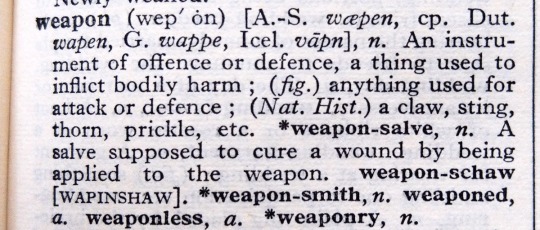

*****
"Decimate" turns up all the time, usually when the correct word is "devastate".
Merriam-Webster says: "It's totally fine to use 'decimate' as a synonym for 'devastate'. This is why."
Beg to differ.
As the M-W article points out, "decimate" originally meant a Roman military punishment applied to one man in ten of a guilty unit. (Initially execution, but this had a rotten effect on unit morale, so it was reduced in severity to fatigues, extra drill or restricted rations.)
That's now considered a far too specific meaning and only linguistic pedants dig their heels in. Quite right too, and I speak here as a (bit of a) linguistic pedant...
However, it remains a useful word for more generalised incomplete destruction of living things - saying a regiment, flock, herd or population was "decimated" implies there are some survivors without quibbling over how many tenths. If totally wiped out, however, that's when words like "destroyed" or "obliterated" are more appropriate.
On the other hand something inanimate like a factory, city or region would be "devastated" - and in addition, saying someone is emotionally devastated is understandable, but saying they're emotionally decimated is peculiar.
Two words, several meanings.
It's like cutlery: a spork can replace knife, fork and spoon, but individual utensils give a lot more precision and variation of use.
*****
There are also a couple of real howlers, not just transposed words but actual errors.
One I've heard several times is using "siege" (a noun, or thing) instead of "besiege" (a verb, or action).
For reference, there's a term called noun-verbing, and the practice is quite old: "table the motion / pencil you in / butter him up / he tasks me", but all are either when there isn't already a verb-form of the word, or as a more picturesque way of saying something.
(Interesting side-note about "table the motion": in US English, it means "to postpone discussion" while in UK, CA and I think AU English, it means the complete opposite, "to begin discussion". Why there's this difference, I have no idea, but it's worth remembering as a Brit-fix when writing, also in a real-life business context.)
There IS an existing verb for the action of surrounding a castle and cutting it off from outside help, and that verb isn't "sieged". It's "besieged" or "under siege". Anywhere using "sieged" as a verb is wrong. The Firefox spellchecker in Tumblr Edit Mode is telling me it's wrong right now.

Merriam-Webster, I'm looking at you again.
*****
There's also "coronate" used as a verb. "The King was coronated at Westminster Abbey". Nope. He was CROWNED.
Coronate is an adjective (meaning crown-shaped) and was coined in in the 1600s by a botanist, as a word to describe the shape of certain plants.
The current Royal-associated usage seems to be a bastard back-formation from "coronation", because the act of putting on a crown is the verb "to crown".
This is almost identical in German, French, Italian and Spanish, with noun and verb the same. The only difference is that their verbs have, what a surprise, verb-endings (-en, -er, -re and -ar) on the noun while English does not.
Because English doesn't like to make things that easy...
"Coronated" might be people trying to sound archaic, or those who've bought into the dopey "said-is-dead" school, who perform any linguistic contortion to avoid common words, and who've been taught that repetition in a sentence - "crowned with a crown" - is BAD.
Is "coronated at a coronation" in some way better?
Guess what's got uncritical examples...
If that's M-W scholarship, I'll stick to the OED and my old but utterly reliable New Elizabethan Dictionary, thanks very much.
*****
Language is funny: sometimes funny ha-ha, sometimes funny annoying, but often just funny peculiar, because English etc. etc...
79 notes
·
View notes
Note
People who advocate communal living over the nuclear family don’t know anything about communal living or what it’s like, and probably believe the nuclear family was invented in America in the 50s.
Fact: nuclear family styled homes have been the norm among Germanic and Anglo-Saxon since medieval times. Further evidence suggests nuclear families existed in the Stone Age.
Fact: communal living is usually a recipe for gerontocratic inbred filth-living. “Oh, grandpa molested the girls again. Oh well, he’s the patriarch and we can’t do anything about it. Time to go sleep on a wide bed with my six cousins. My mom will cook for me until she dies. They’ll arrange marriages for me because how the fuck would people date in a living situation like this?”
Fact: the nuclear family offers more freedom for the kids and the parents both
Fact: the only reason people rail against the nuclear family now is because homes are so expensive. If homeownership became easy and commonplace again, people would want to live on their own with their spouse and young kids
This is all clearly very BAP influenced, and your latter three "facts" are just opinions (BAP's opinions I gather), and not very well substantiated ones at that.
More importantly, the longhouse arrangement is not what I was referring to when I talked about "more communal child rearing". I described a situation in which
Children have physical autonomy to move around within a community freely and leave the home without parental oversight
The responsibilities of childcare are understood to be distributed throughout the community, to the various adults in whatever measure they can provide
Children are free to associate with those adults they feel most comfortable around. I have heard (but not corroborated), in the context of the Caribbean where I gather childcare is often more distributed in this way, of children essentially "voluntarily adopting themselves" into other families that they liked better than their own.
The interactions that adults have with children are essentially open to public scrutiny by other adults, an expansion of the way that universal public schooling makes the abuses of parents more visible to other adults who can intervene.
The situation you describe, where "grandpa can molest the girls because he's the patriarch", is precisely the situation I'm trying to avoid. That is the outcome of nuclear family. Nuclear family, children isolated to the home and treated as property of their parents with no say in the matter, that's a child abuse factory.
BAP is all aesthetics. I'm not saying he has nothing of value to offer at all (I don't know, I haven't read him), but he does not have policy, he does not offer mechanisms. I (attempt to) offer mechanisms. They might not be perfect, or fully fleshed out, but they are a start. Come debate me at that level instead of saying "FACT: [opinion]".
66 notes
·
View notes
Note
Sorry to ask something somewhat related to the recent discourse, but do you have any advice to someone trying to teach themselves lit analysis or lit theory? Seems like most online advice ends at "get an English degree lol"
first of all sorry for leaving this for so long, between work and various other Demands in my life i didn’t really have the time/energy to sit down and write up a proper answer for a while. anyway: imo, what’s more important than working your way through a long list of critical theory is honing an ability to respond to a text yourself; being able to take notice of your emotional responses, being able to ask questions about what the text does and what it responds to and whether you think it succeeds or fails. questions like ‘what is the text about?’ are often too vague, and assume that critical practice is a task limited to investigating the ‘correct’ metaphysical properties of a text that we have to uncover, as well as presenting literature as wholly utilitarian (under this framework, a text becomes a vehicle for a ‘theme,’ and nothing more.) in the list below, i’ve tried to be a little more precise about the kinds of questions that can help you become a more confident + critical reader.
[disclaimer: i am not any kind of expert, i have studied english lit at degree level and i do read a lot / make a habit of talking about what i read, but i would not consider myself especially ‘qualified’ and nor should you. i’m explaining a process that works for me, not providing a one-size-fits-all solution to the question of analytical methodology.]
the essence of literary practice is that a text has a terrain where it has to be met with, and where it will be accountable to forces that are often beyond its control or beyond its immediate borders, and a terrain where it asks to be met with, and towards which it will attempt to navigate the reader; the reader’s job is to meet with it on both terrains, synthesise them, and respond to them. so, some of the questions you should be asking about a text include:
what is its context? this can mean a lot of things: when and where was it written, and how might the conditions contemporary to its creation be informing the inner working of the text? is it considered part of a particular literary movement; how does it interact with the core characteristics of that movement? does it invoke other works; if so, how does it respond to them? what biographical information about the author might be relevant to the piece? some books will come with an introduction which, if written well, would cover at least the outstanding details on this list; you can also have a look on wikipedia or other such websites to get a feel for the conditions under which the text was created.
how does it respond to this context? rather than assuming a text to be a passive body onto which its external conditions are exerting their unilateral force, we should always understand a text as being in active dialogue with the context that shaped it. what are the questions typically posed within the movement or genre to which it belongs; how does it answer these questions? does it build on its predecessors in any way? if it’s a responsive text (ie. consistently invoking an earlier text), what does it have to say about the text to which it responds; how does it develop or contravene the template from which it was building? how might it be responding to the questions of its time; which paradigms are challenged? which are endorsed, actively or tacitly? what goes unmentioned? i emphasise critical engagement with context so heavily because it’s often where the meat of the text can be found.
what are the conditions which made this text possible? this is a little different to questions about context, which have a far broader scope; this is a question which seeks to treat a text not as a thing that came into existence of its own accord, but as a thing that emerged as a result of a process of material production that depends upon particular conditions. is it a mainstream publishing house, or an indie press, or self-published? how does this affect its authority, or the standard to which we hold it? how does this affect its relationship to narratives of cultural hegemony? what can that tell us about what hegemony can and cannot absorb? this is me being a big marxist about it but i think this question is woefully neglected in literary studies lol
why did the author make the choices that they made? one of the most important things to remember when it comes to literary analysis is that every choice made in a text is deliberate; every choice about what happens, what a character says and does, what a character looks like, how particular characters interact, how scenes and objects and settings are described, what prose style is employed, what word is used in a sentence, etc., is a deliberate choice being made by an external agent (ie. the author, sometimes/arguably also the editor, also the translator if a text is in translation), and those choices are accountable both to the deliberations of the author and the external cultural narratives with which they necessarily enter into a dialogue. ‘why does a character behave in a particular way’ is not a question that invites you to treat the story like a riddle for which you can find an ‘answer,’ but a question that engenders the following: what does their behaviour reveal about the character, and how might this be situated within the discourse of the wider text? does this behaviour reveal any biases on the part of the author? what sort of expectations does this behaviour establish, and are those expectations met or neglected or subverted? the same process can be applied to themes, settings, plot beats - anything, really. why is this particular adjective used - does it have other connotations that the author might want to draw attention to in relation to the object being described? why does this chapter end here and not here? nobody in a novel has agency that extends beyond the boundaries of the novel itself; part of the practice of analysis means discerning which choices were made and why, and whether those choices were good or bad.
what is your response? analysis is a misleading term for this practice; it’s less about dispassionately picking at a text in search of an ‘answer’ and more about evaluation - assessing the text’s successes and failures and cultivating your personal response to it, which means paying attention to your responses as you go along. some people would argue that ‘did you like/dislike this’ is a juvenile question, but i would disagree - knowing whether you liked or disliked something and being able to describe why it evoked that reaction in you is crucial to an evaluative practice. a text can be conceptually excellent, but falter if its prose is clunky or uninspired or unimaginative; being able to notice when a text isn’t engaging you and asking why that is is an important part of this evaluative process. similarly, what do you make of the themes and developments present in the text; does it dissect its themes with precision, or does it make broad gestures towards concepts without ever articulating them fully? is it original? does it have sufficient depth to it? do you agree with it? are you compelled by it? if you were asked the questions that the novel tries to respond to, what would you say; do you think that the novel misses anything out? has it challenged your own perspective? what are its limitations?
literary analysis is a learned skill, but by its nature of being a skill it gets a lot easier over time, and some of these questions will become intuitive. a good way to hone the skill and develop a greater intimacy with a text is through close reading; this refers to the practice of selecting a passage (or even just a sentence) and picking it apart line by line (word by word, even) to describe in intimate detail exactly how the sentence(s) came to be formed in the way that it/they did. i’ll use the first few sentences of daphne du maurier’s rebecca as an example.
Last night I dreamt I went to Manderley again. It seemed to me I stood by the iron gate leading to the drive, and for a while I could not enter, for the way was barred to me. There was a padlock and chain upon the gate. I called in my dream to the lodge-keeper, and had no answer, and peering closer through the rusted spokes of the gate I saw that the lodge was uninhabited.
so a close reading of these sentences might identify:
‘last night i dreamt i went to manderley again’ is in iambic hexameter; this rhythmically satisfying invocation makes for a smooth opening sentence, and contrasts with the longer, more complex sentences that follow on. the change in rhythm through such a contrast helps to maintain momentum throughout the paragraph.
the first sentence also introduces a few key pieces of information - that this story is being told from the first person, that we are opening with a dream (and that the narrative places stock in the significance of dreams), and that the speaker is going to manderley ‘again’ - ie. that this is opening after an event in which manderley was significant. that the speaker going to manderley ‘again’ in a dream holds importance implies an exile from manderley in the ‘real’ world; this already gives us hints at the broader shape of the narrative.
the speaker’s intimacy with manderley and disregard for ‘telling’ the reader what it is (we do not get, like, ‘manderley is a house’ or something - the passage continues as though we know what manderley is already) helps to develop our sense of immersion in the dreamscape. it also sets manderley up as a place of immense significance.
both ‘it seemed to me’ and the later ‘i called’ have a matter-of-factness to them, a certain dry reporting of the events of the dream which, rather than situating the reader within the texture of the dream itself, refortify us as outside of it, listening to it be explained after the fact.
‘for a while i could not enter, for the way was barred to me’ continues the theme of implied exile that the first sentence gestured towards. the iambic trimeter on ‘the way was barred to me’ creates a lilting cadence which, along with the use of the passive voice, detaches the speaker from an emotive response to this being ‘barred’; it is a reported dream that will not consciously acknowledge the speaker’s feelings about being exiled from manderley at this time. (we instead infer these feelings through how the chapter develops.)
‘there was a padlock and chain upon the gate,’ as a short sentence, falls into the same matter-of-fact register as that which i alluded to above, partly through the use of the passive voice, and - as i explained earlier - varies the length of sentences such that the paragraph retains a particular buoyancy.
the development from the speaker calling to the lodge-keeper to not getting an answer to seeing that the lodge is uninhabited tells a story wherein the speaker at first has authority such that a lodge-keeper would respond to her and let her in; this authority is negated by the lack of response; the lodge-keeper is found to be absent in a development that took place whilst she was herself away, presumably in the state of exile that we have inferred her to be in. ‘uninhabited’ is the kind of word you would expect to be used for an area of land, often with a colonial connotation; this introduces a theme that this chapter (& the book as a whole) goes on to develop, of manderley being a site of colonial decay; as reinforced by the ‘rusted spokes.’
in my experience, close reading is a technique best practiced on poetry, but it’s a very helpful skill to develop in general, and implementing it with prose can elucidate the nuances of a text far more clearly than you might initially realise. in a well-written novel, language is very deliberate and precise!
i think the best thing you can do to develop your skills as a critical reader is to read carefully, and to keep track of your responses to a text as best as possible. keeping a note of what you think a text achieves and how you respond to it each time you read one can be a good way of sorting your thoughts into something coherent and developing your ability to articulate a response. anyway, hopefully this has provided something resembling a guide for how to develop the thought processes that go behind critical practice!
544 notes
·
View notes
Text
RW Headcanon: Goodnight, Moon
AHHH YESSSS, now that that Lilypad essay is done I can FINALLY share these—!
Hey, @ghostlycoze! So you remember a few months ago how I made that drawing acting on the Moon beepsnort headcanon, and how in my last reblog I eluded to the possibility of drawing out some of your headcanons again? Well, it looks like that time has come, and this time I've got not just drawings, but lots of additions to another headcanon of yours!
This time, it's from your tags in these three posts, which I also saw a while ago! Yet for some reason I began thinking about it again recently, and as is my nature with ideas I like, I decided to develop it further, and even draw it this time!
Also, just to preface, you'll see I did a bunch of notes beside the actual drawings as well. I'll share the picture and roughly type out the notes (in case my handwriting is a bit hard to read) as well as whatever info I couldn't fit on the page. Some of the text also just says "robots" rather than "iterators" because some of these ideas are stuff I actually imagine applying to robot characters in general! Maybe I'll make a post on that someday...
With all that out of the way though, the actual headcanon is under the cut! Hope you like it!
-.-.-.-.-.-.-.-
What are iterators like when they’re sleepy? Do they even get “sleepy” the way we humans do? This headcanon answers that question with a focus on the iterators’ puppets. Much of this info is also framed in the context of a hypothetical “worm-off-the-string” scenario, since I believe that’s the main situation where sleep and getting tired would actually matter to the iterators.
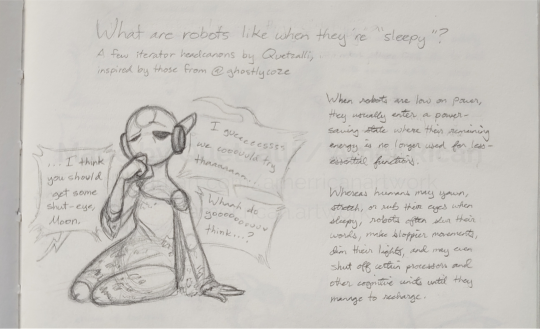
Firstly, when iterator puppets are low on power, until they find a place to recharge they usually enter a power-saving state where, to conserve what’s left of it, their energy is temporarily redirected away from some of their less-important processes. The side-effect of this, however, is that iterator puppets show symptoms of drowsiness kinda like humans! Whereas humans may yawn, stretch, or rub their eyes when sleepy, iterators will often make sloppier/less precise movements, close their lenses a little, and may even have a harder time thinking, since they sometimes shut off some processors and other cognitive functions until they can recharge. The most common symptom, however, is slurred speech, coming from less power given to their speech-forming software.
Another very-common sign of iterator sleepiness is frequent beeping, often in place of words. This is because, like slurred speech, beeps take much less energy and processing to make than analyzing data, formulating a complex response, then vocalizing it clearly. Beeps are thus far more efficient for conveying simple emotions and reactions than words. Looks to the Moon in particular gets super beepy when she’s tired because she and other early models relied more on beeps for communication — they were made back when things like vivid emotion weren’t as taboo in Ancient society, and iterators were meant to be more friendly and openly interactive with their citizens — so she’s more used to beeping to easily express her emotions.
As a side-note and mini-headcanon (wow, real headcanon-layering action here), while even the newest iterator puppets can beep, the older iterator models, as a result of this design influence, also have a much greater “beep-vocabulary” with a wider range of sounds that shrunk with the generations. Their beeps are thus a lot more expressive as well, with some sounds even being similar in nature to animal noises or regular speech! I imagine the entire range of their beeps would closely resemble shorter versions of the “droidspeak” sounds of the astromechs in Star Wars.
But, back to sleepy iterators.
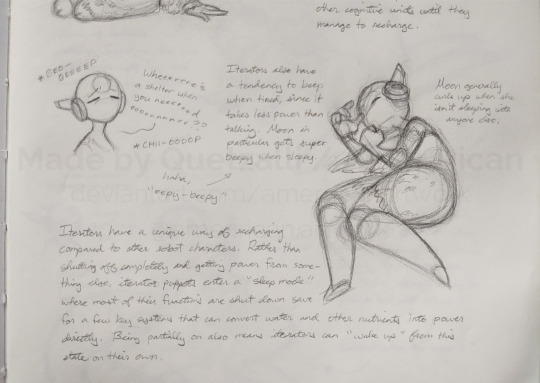
When it’s hibernation time, iterators enter a “sleep-mode”, where almost all of their systems are shut down and recharging becomes the primary objective. However, compared to how I imagine other robots, iterator puppets have a unique way of recharging. Rather than shutting off completely and absorbing power from an external source, iterator puppets have a few key systems within them that remain on even during sleep-mode. These systems, just like those in their superstructures, are capable of converting nutrients into power directly. They emit a soft, rather comforting whirr while the puppets sleep — the only sound iterators make while sleeping, and comparable in nature to stomach sounds during digestion. Otherwise, though, the only other systems remaining on during sleep-mode are a few basic senses, and a program that decides when to “wake up”. The presence of this program also means, uniquely to iterators again, they can wake up on their own, rather than having to be powered back on by someone else like other robots. Overall, these systems are yet another aspect of iterator designs that make them far more biological than many iterators (*cough* *cough* Pebbles *cough*) would like to admit. And in my imaginings of a “worm-off-the-string” AU, systems like these are one of the main sources of both physical and internal conflict for these characters.
Also, since most of their systems are off during sleep mode, iterators sleep, both figuratively and literally, like statues. Whatever position they fall asleep in is the position they remain in the entire time unless a.) someone moves them or b.) they wake up and move on their own. This also means (unfortunately, if you thought these ideas would be cute) that iterators do not snore, shift around, sleepwalk, sleep-talk, or dream while in sleep mode.
That’s about it for this headcanon as it applies to iterator puppets overall. Now, I’m gonna get into how I imagine Looks to the Moon specifically likes to sleep.
In addition to getting very beepy, Moon also gets very cuddly when sleepy, though some of this comes from her affectionate personality. However, it's also due to a lasting trauma from her collapse. Of course she's learned to tolerate the rain over time, yet after spending so many cycles being rapidly drowned over and over in her can — with endless disorientation and senses so out-of-control from being disconnected from most of her superstructure, no one around to comfort her save for the occasional wandering creature, and the knowledge that her own beloved brother was responsible for this — it’s still left a fair amount of bad memories with her, especially from those cycles most recently after her collapse/revival, and this general unease often resurfaces with the sound of the rain. Therefore, whenever the rain comes, this trauma serves as another, more internal reason Looks to the Moon always wants to fall asleep holding onto/being held by someone, or at the very least while sharing the shelter with someone she loves.
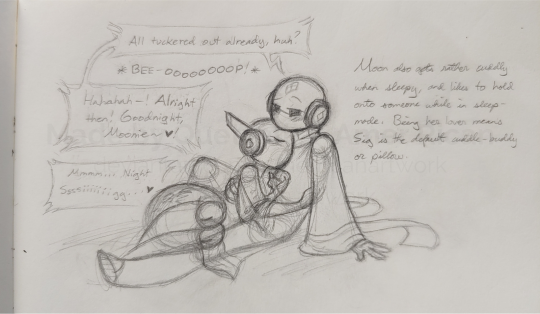
On a more positive note, since I’m now officially a Lilypad shipper, I imagine that No Significant Harassment is Moon’s default choice of cuddling partner! It can be a little hard to get in position — I imagine Moon always likes to be the little spoon despite her being slightly taller than him — but they manage! Moon pretty much always falls asleep first, because, as the oldest model of the group, and having sustained the most damage post-collapse on top of that, she simply doesn’t use power as efficiently as the others do and therefore gets tired much more easily. In some ways, the poor thing even feels a little guilty about it; she’s supposed to be the leader of this group, and yet here she is, tiring out after less travel and growing drowsy before the rain even starts! Luckily, Sig makes an effort to ensure her she’s more-than worth keeping around, because after every awful thing the world has thrown at her kindness, the least she deserves is some quality guilt-free nap time! And sometimes, if they want a little alone-time (or if Pebbles gets too fed-up with their lovey-dovey gestures), it’ll be just the two of them, and perhaps their slugcats, cuddling together in the shelter.
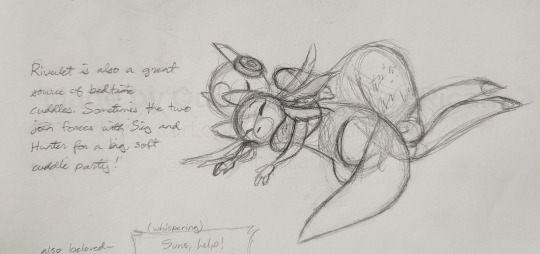
And speaking of slugcats, Moon’s second choice of cuddles is Rivulet! Being very soft, warm, and equally cuddly, she makes another good source of cuddles for Moon. And sometimes, if Hunter’s also around and willing, the two join forces with Sig and Hunter for a big, soft, cuddle-filled slumber party!
Still, though, Sig is definitely no. 1 provider of snuggles for Moon. But he loves her dearly, so for the most part he doesn’t mind! Since she falls asleep first, some of his favorite moments each cycle are from just watching her and holding her close as the rainfall echoes from outside; she always looks so beautiful when she’s relaxed, and having her in his arms makes him feel like he can protect her no matter what. So he never really minds when Moon, slurring her words, tiredly asks for him to hold her while she enters sleep mode.

That is, except when this happens and he’s stuck in that spot for the next several hours…
A few more ideas to this headcanon:
Moon’s third choice of cuddles is Five Pebbles. It’s a bit interesting, because in basically all other scenarios Pebbles insists on sleeping alone in a separate shelter, even though he’s actually rather touch-starved (though it'll be a while before he admits it). Moon is one of the only people he’s actually willing to sleep with, besides occasionally Artificer (in which the feeling is mutual and no one else must be in the room). If I someday decide to ship Pebbles with someone, I imagine he’d also be willing to sleep with them, again, only if no one else is around to see it.
To elaborate on the last point and shift to Five Pebbles’ perspective, the reason why Pebbles always wants to sleep alone is because, as I imagine the worm-off-the-string story so far, Pebbles’ biggest internal conflicts are learning to accept all those “worldly attachments” the Ancients so strongly rejected, and overcoming his god-complex and fear of relying on others. And one of the main ways this manifests is him being so deeply embarrassed to be dealing with these basic survival needs — like yet another one of the savage beasts roaming the world, after having been a vast mechanical god so far above those primitive creatures — that he refuses to let others, even his friends and family, observe him in such a “pitiful” state whenever possible, and resolves to try and overcome it alone.
To further continue this idea, this is why Moon sometimes insists on sleeping with him. Even though he’ll have to overcome these conflicts on his own, it doesn’t mean he has to be alone while he does it. She makes an effort during these and other moments in this scenario to assure him that it’s okay, no one’s gonna judge or punish him for living this way, and she’ll always be there if he ever decides to accept some help. Pebbles always falls asleep with his head buried in her chest and holding onto her very tightly.
The iterators often like to sleep with their slugcats, who in the AU also stick around a lot to help guide them as they figure out the ins-and-outs of organic survival.
Both Moon and Pebbles tend to sleep in a curled position. It's actually very similar to how slugcats generally sleep!
Pebbles is quite the workaholic in general, but it also means he has a hard time falling asleep — not because he doesn’t get sleepy, but rather that he often denies it or its significance in an attempt to get more done that cycle (and because, again, he’s “too advanced” for animalistic things like sleeping). The group often has to literally drag him to bed to get him to sleep, and Sig often teases him when his lenses start drooping and his syllables begin to stretch.
In extreme cases, where almost all of their power has been exhausted, iterators won't just slur their words anymore, but their speech will often lose coherency overall, like a spoken case of very drunk typing .
When sleepy, Moon not only slurs her words, but has a tendency to say rather strange and very silly things. It’s another side-effect of less power being used to actually think through her words. There have been many instances where the whole group erupted in laughter after Moon made a really out-of-left-field comment!
Oh, and here's one last quick doodle based off one of the ones above:
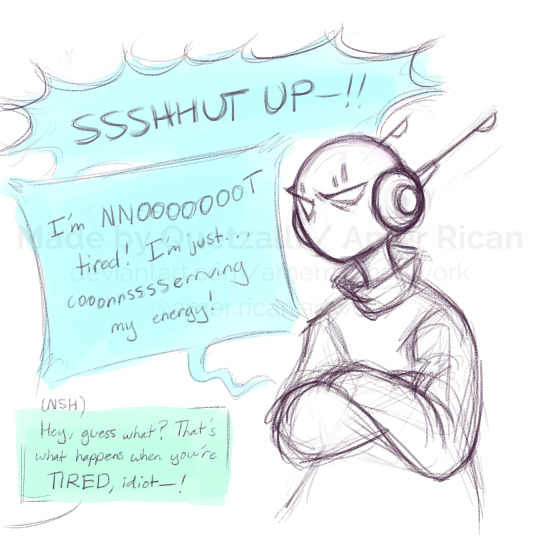
-.-.-.-.-.-.-.-.-
Aaaand that's all for another headcanon! Even though it took me a whole week to do the drawings, it was SO fun getting to develop this idea, especially since sleepy Moonie is such a cute concept! I am so glad that you shared that little idea, Ghost!!
And speaking of which, if you've made it all the way down here, Ghost, may I invite you to add any more ideas to all this, if you want? I'd especially love hearing ideas for the other iterators' sleeping habits (how fast they get tired, what position they like to sleep in, who they usually sleep with, how they wind down before bed, etc.)! I mainly focused on Moon and a bit of Pebbles at the end, since I'm still trying to get a read on Sig and Suns's personalities (especially Suns), so it'd be fun to even further expand on this idea in that regard! Of course, you don't have to, but it's a proposition!
But regardless, I hope you and anyone else who made it to the bottom enjoyed my contributions to the idea! And be sure to keep the adorable headcanon ideas coming!!
-.-.-.-.-.-.-.-.-
Bonus: Here are the full sketchbook pages, in case anyone was interested in seeing the completed layout! I think I'm gonna be making more of these kinds of drawing/explanation combo artworks!3
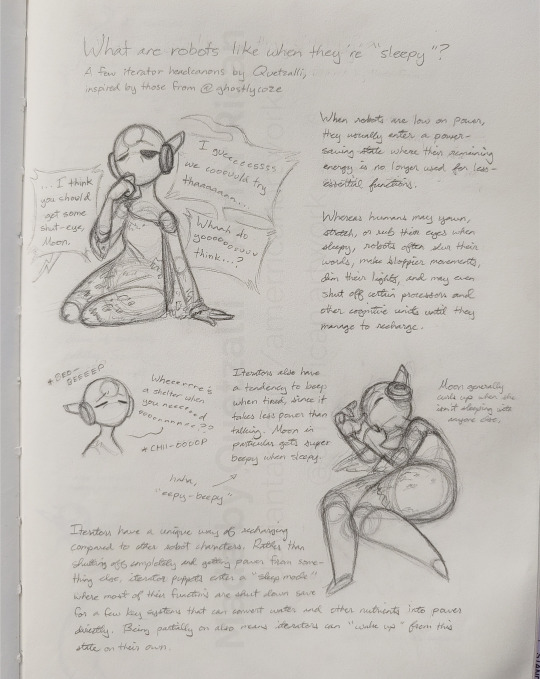
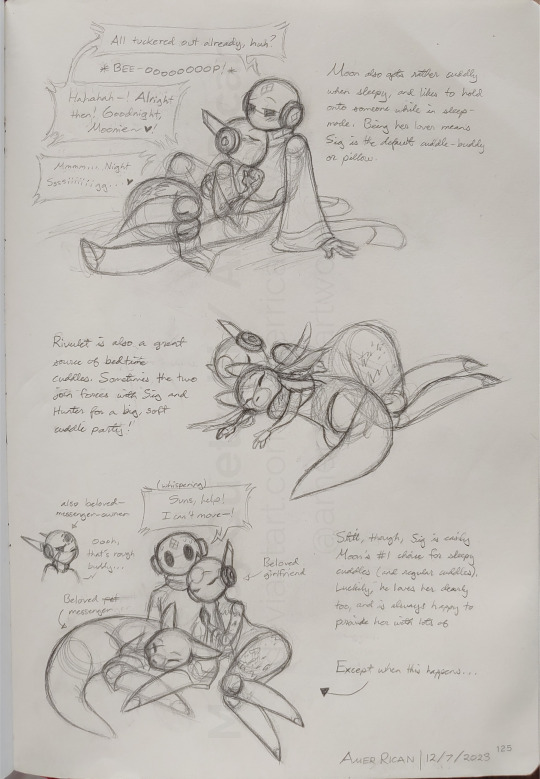
#art#artwork#artists on tumblr#drawing#drawings#sketch#sketches#pencil#traditional#traditional art#fanart#rain world#rw headcanons#shipping#rw shipping#iterator#rw iterator#looks to the moon#LttM#rw lttm#no significant harassment#NSH#rw nsh#five pebbles#FP#rw fp#rivulet#rw rivulet#quetzalli draws#quetzalli headcanons
95 notes
·
View notes
Text
12/?? Things come to a head
(Previous) | (Index) | (Next)
⛬
We return to that shambling mass of a film, Prometheus.
Content warnings for body horror, contagion-y stuff, something that loosely be described as medical horror, It’s Been 0 Days Since Our Last Incident, and me, going on a ramble about movie gore to distract myself from The Madness.
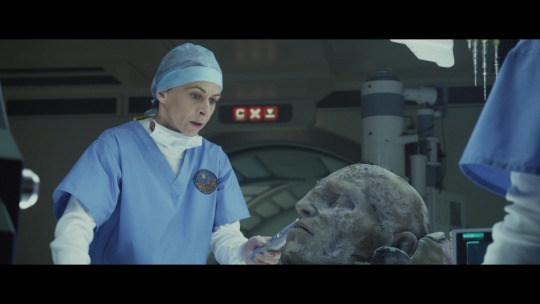
There's a lady in this scene who's had a number of speaking lines so far–the maybe-chemist. She has a name, but it doesn’t matter.
But I'm going to call her Doctor Frankenstein.
They have just got the helmet off the head, revealing that it’s truly, unmistakably humanoid. They have noted that there are “new cells” on the head. In the business, we call that “decomposition”, but Doctor Frankenstein is not concerned with this. In fact, she immediately proposes a new plan.

Doctor Frankenstein has had the brilliant idea to plug a big cable into the head like it’s a guitar amp, and zap it with electricity to wake it up.

Yes. This is what the movie goes with.

You know, Alien included a similarly shambolic first examination of an alien subject, but it was performed because said alien was attached to a man’s face, and all they had to try and fix that was the contents of a cargo ship’s medbay, with the only qualified personnel being the corporate android who had been ordered to consider the crew expendable. The crew of the Prometheus has no such excuse.

Well, except for David, he has precisely the same excuse, but he’s not trying to poke wires in anybody’s ears.
Doctor Frankenstein calls for enough amperage to run three electric kettles (cite 3), then all the way up to two Titan RTX graphics cards before the head starts to get what appears to be a massive migraine.
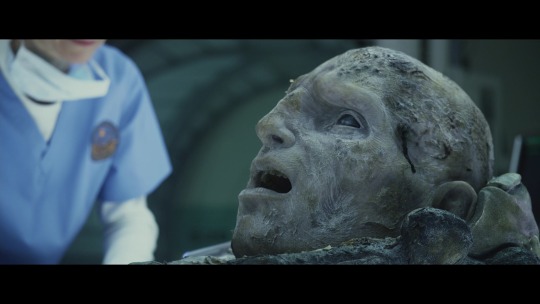
I know this expression well, migraines can feel very much like someone is subjecting me to unnatural horrors.

This is getting a little extreme, though. Yes, when the head starts pulsing, they realize they may have made a mistake.
I’d say this was inexplicable behavior on their part, unbelievably hasty and foolish–and I will say it, actually, it deserves to be said. But in context, this is the team that did so little prep for entering the alien structure that they didn’t notice the giant fuckoff skull carved into the outside of it.

Knowing how much Shaw and Holloway read into the intentions of the Engineers from the depictions they found on Earth, they probably would’ve interpreted this as a good sign, somehow.
Anyway, they put a sneezeguard down over the head before it explodes.
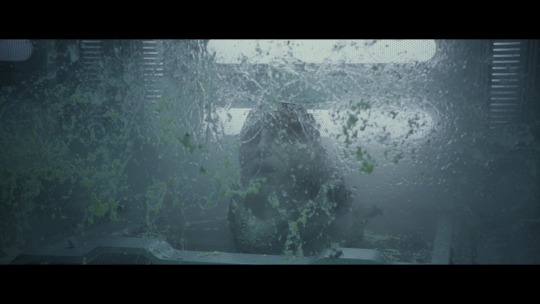
Good job everyone. This is like what would’ve happened if Napoleon’s savants took one look at the Rosetta Stone and decided “maybe we should try hitting it with hammers. Surely that’ll make the knowledge fall out.”
From a horror perspective, this scene only works in two contexts: First, gross-out. Generally found in schlock, exploitation, and outsider art flicks, the tone of gross-out content can be highly variable, but there are two general trends I'd mention, which are of relevance to this movie.
First, gross-out tends to exist in that weird alternate space where lots of comedy movies do: characters will behave in unreasonable ways for no apparent reason. Within the film, this is treated as the universal norm, besides maybe a straight man character who highlights the absurdity. Gross-out is often like that, but pushes different boundaries of acceptable behavior than a traditional comedy.
This is, bafflingly, what Prometheus increasingly feels like. It feels like it's transitioning into gross-out schlock, and yet it never goes all the way.
Second: the audience for gross-out is largely self-selecting. If you're watching John Waters' Pink Flamingos, you expect things to get messy. You are looking forward to things getting messy. A head exploding is perfectly par for the course in gross-out horror. One might even be disappointed if there wasn't an exploding head.
But again, this movie was not marketed on gross-out. It was marketed as a tense, Alien-esque horror movie. If you followed that premise like I did, you're not in the theater to view a debauched spectacle, you're there for the movie to put a well-paced squeeze on the characters and your nerves, where half the horror comes from having the room to really think about how frightening the core concepts of the series are.
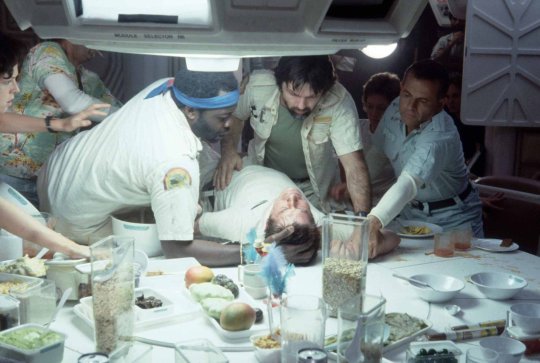
Does Alien involve some shocking gore? Sure does! But in Alien, Kane's fate is not there to make you laugh and exclaim "ewww!" at how far the film's gone, the film tries to make you very aware of how horrifying his demise is.
So, there's an alternate way this scene works, if you're coming in from that perspective. I don't think the movie intended this as much as the gross-out, but it's what I drew from it at the time: the scene works if you decide not to focus your sympathies on the human characters at all, or even David, and think about it from the perspective of the head.
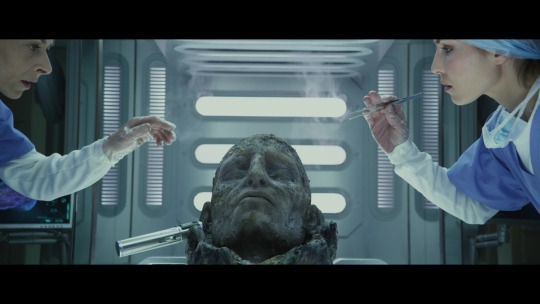
It’s patently impossible that what they did actually “woke up” the brain inside that skull. But if we sink to the movie’s level and entertain the idea for a moment, what in the hell have they just done to this Engineer? The last thing the head would’ve remembered was running, falling, decapitation, and then this. They just tortured this poor bastard for no adequately explained reason. There’s none! “I think we can trick the nervous system into thinking it's still alive” is the entirety of the explanation. It makes about as much sense and seems as thoughtlessly violent as anything in Mad God (2021, content warning for body horror).
I already spent all my anger about desecrating bodies in the name of shambolic pseudoscience, I have no more rage to give for now. And similarly in the theater, I hit my limit. I’d already hit a different limit back when they landed the Prometheus on top of some archaeology, but now I’d fully given up on this movie being what I’d hoped it would be.
The maddening thing that keeps me obsessed with it is that it keeps throwing random scraps of that hypothetical movie into the mix anyway, bouncing me like a yo-yo between scenes.
But for right now, the yo-yo is still on the descent. Having exploded the first sample of alien biology ever touched by science, they apparently stuck some of it in a generic, science-y DNA machine. What does the DNA machine tell them?

“DNA match”.

The movie does not actually explain what this means. It thinks it does, but in a very vague and handwave-y way that ends up being even more hilarious than if they’d just been out-and-out wrong. Because this is what I do for a living, I want to science at this for a bit.
But I’ve written enough about it for an entire post on its own, so that will wait until next time.
⛬
(Previous) | (Index) | (Next)
⛬
Citations for alt-text rambles, as well as some text-text rambles:
1. https://www.behance.net/gallery/78297841/Semiotic-Standard (contains a high-quality download for the symbols, should ye wish them for yourselves)
2. https://www.sculpturedepot.net/clay-wax-tools/product.asp?Steel_Tools
3. Doctor Frankenstein calls for 30 amps first, then 40, then 50 in the space of several seconds. According to wikipedia, an electric kettle is about 16.6A, and a 288W high-performance graphics card would require 24A. https://en.wikipedia.org/wiki/Orders_of_magnitude_(current) That graphics card isn’t mentioned by name, but it matches up with the wattage reported by Tom’s Hardware for a Titan RTX (cite 4). Running with two of these things, you might be able to run 4k Ultra settings on some games without tanking your framerate. They could’ve been playing video games and seen way more exploding heads.
4. https://www.tomshardware.com/features/graphics-card-power-consumption-tested
5. https://en.wikipedia.org/wiki/Alien_(film)#Design
6. https://www.reddit.com/r/MovieDetails/comments/f4rf63/for_the_chestburster_scene_in_alien_1979_the/
7. https://i.pinimg.com/736x/8e/2f/9b/8e2f9b0716746aac7ce5b2f369bf4082--aliens--scene.jpg
8. https://en.wikipedia.org/wiki/Karyotype#Human_karyogram
9. https://en.wikipedia.org/wiki/Centromere
10. https://en.wikipedia.org/wiki/Centromere#Telocentric
11. https://en.wikipedia.org/wiki/G_banding
12. https://en.wikipedia.org/wiki/Proteinogenic_amino_acid
13. https://en.wikipedia.org/wiki/Hula_language
#Prometheus 2012#Prometheus (2012)#This movie is a study in so much tonal dissonance#It was so pretty and yet so broken#insert Benoit Blanc “compels me though” meme here
71 notes
·
View notes